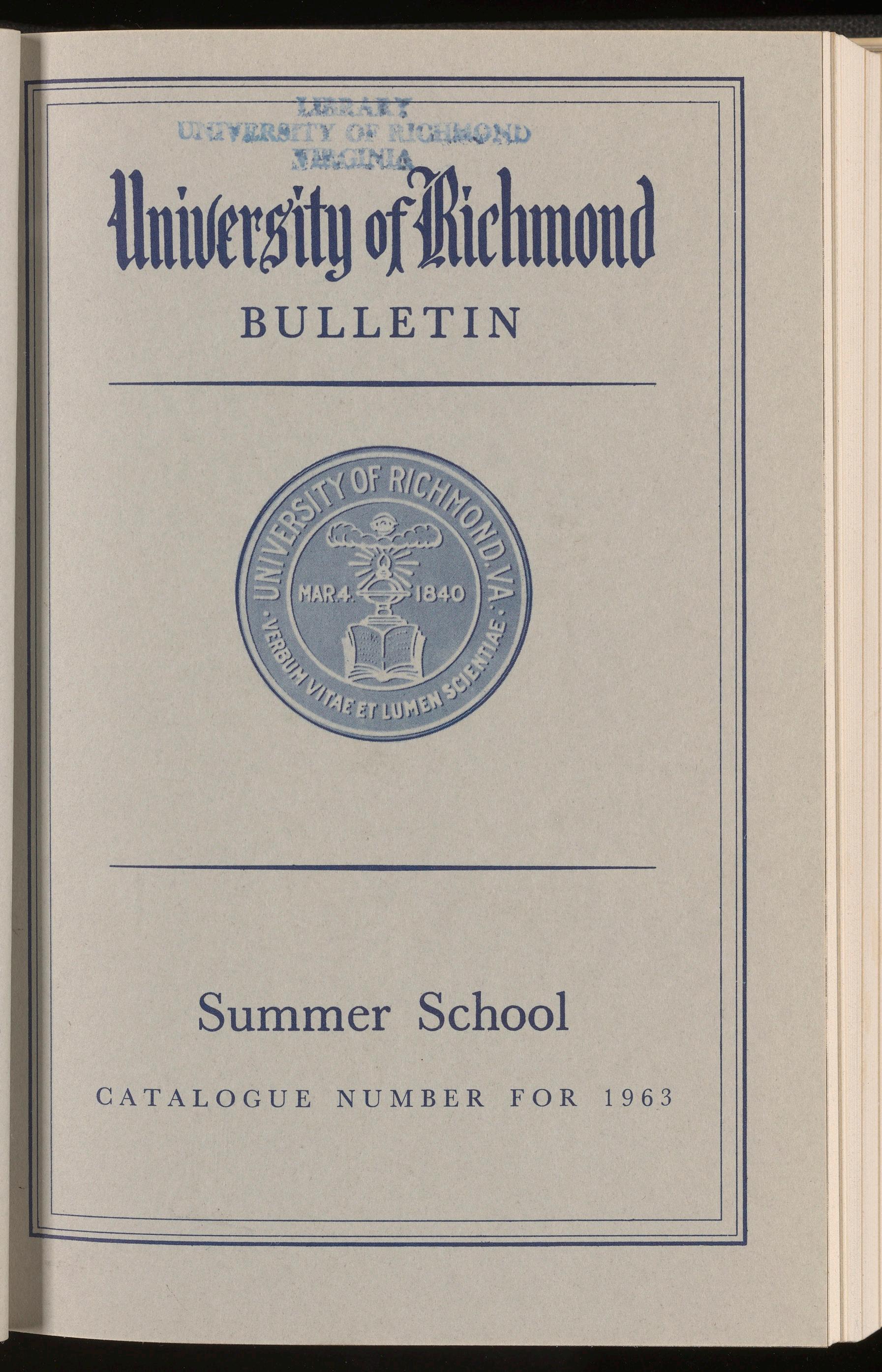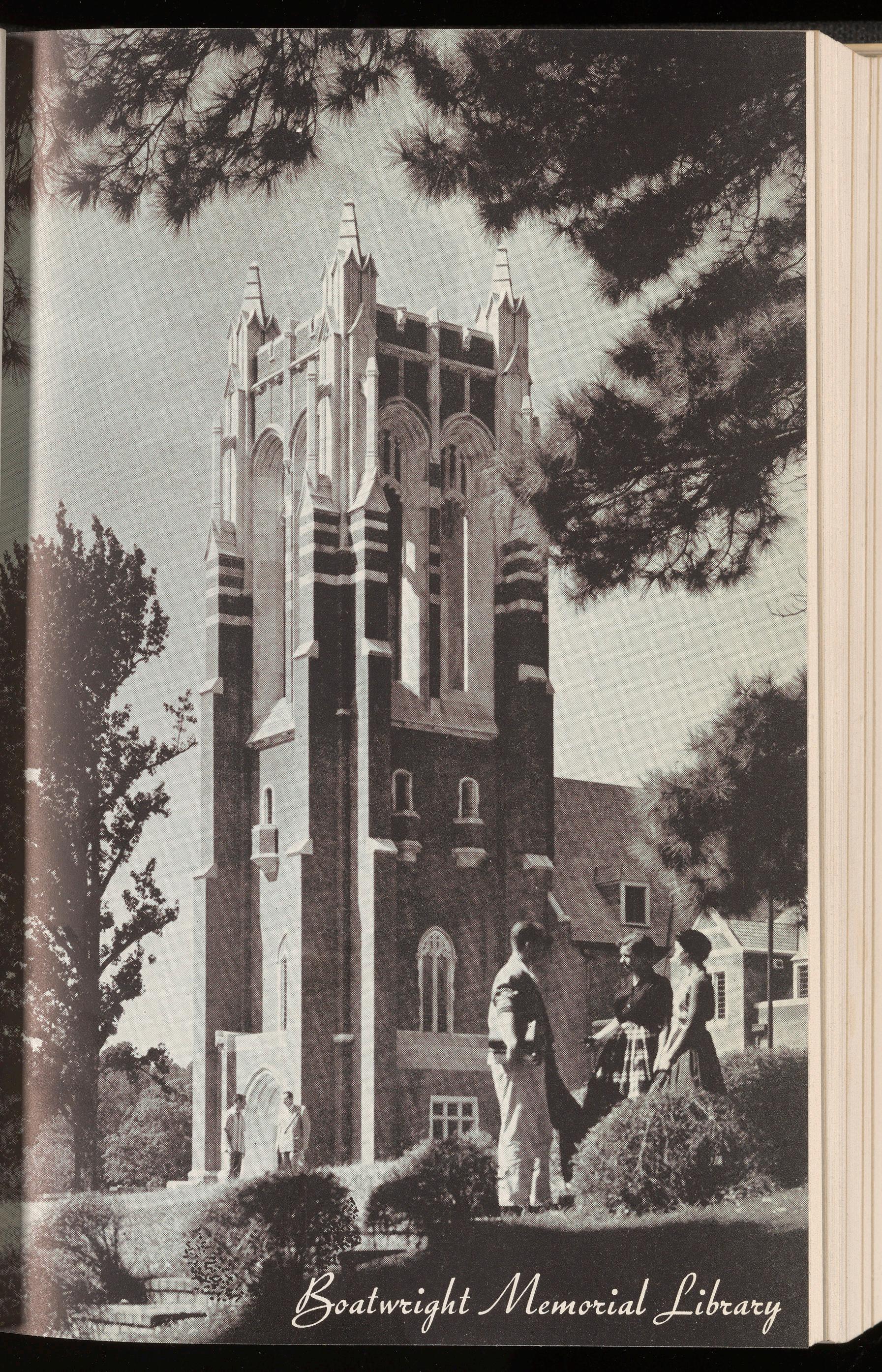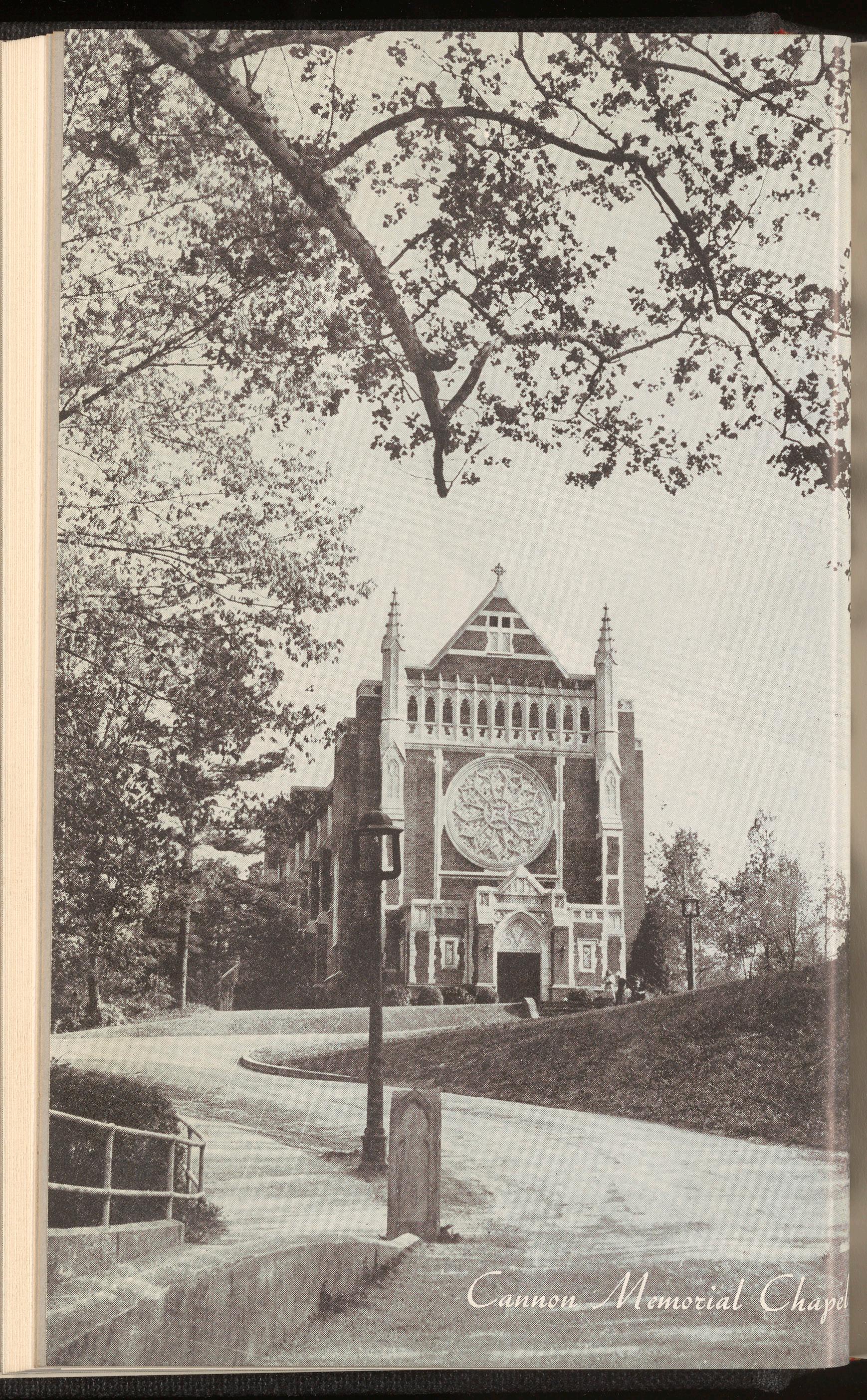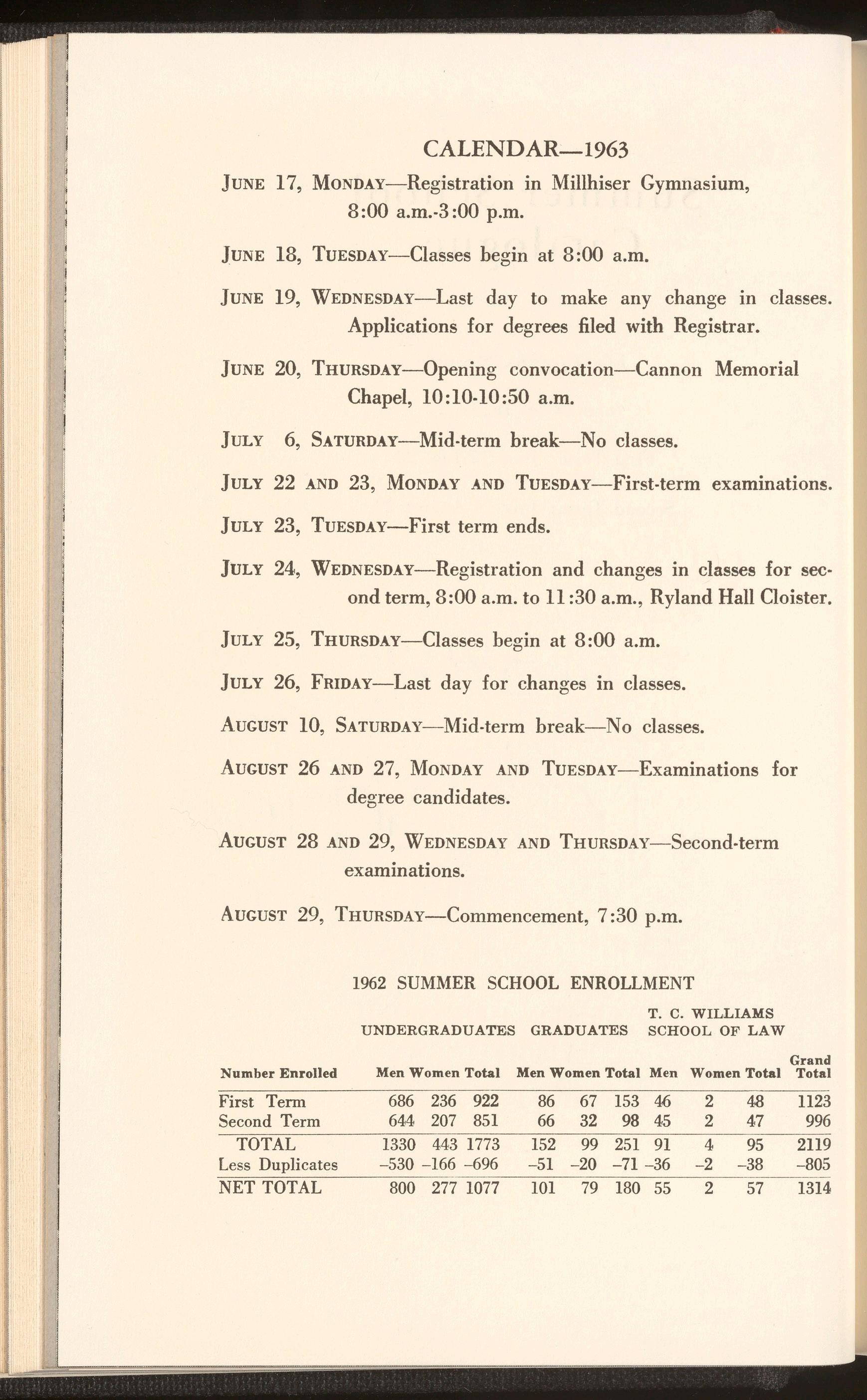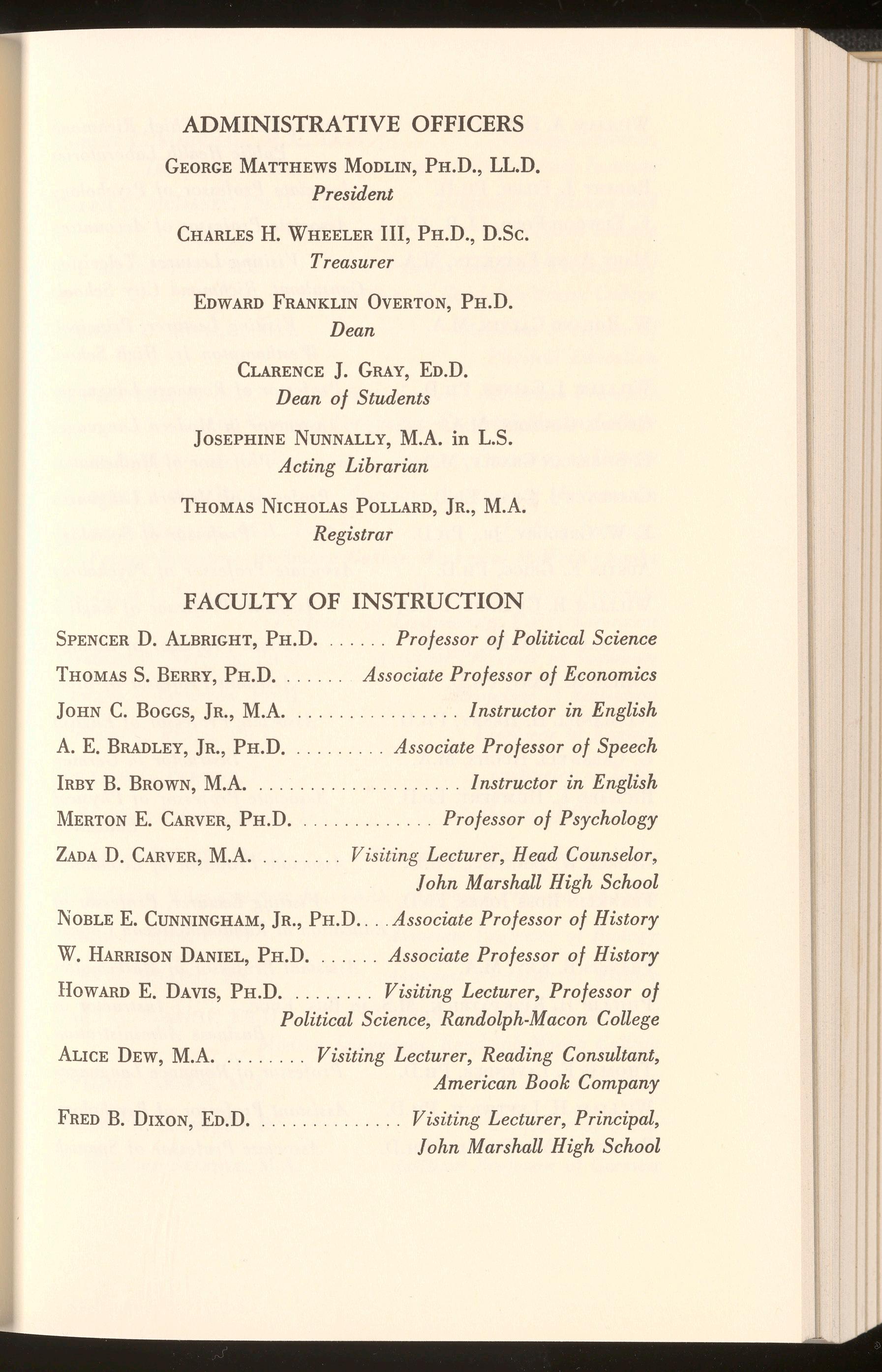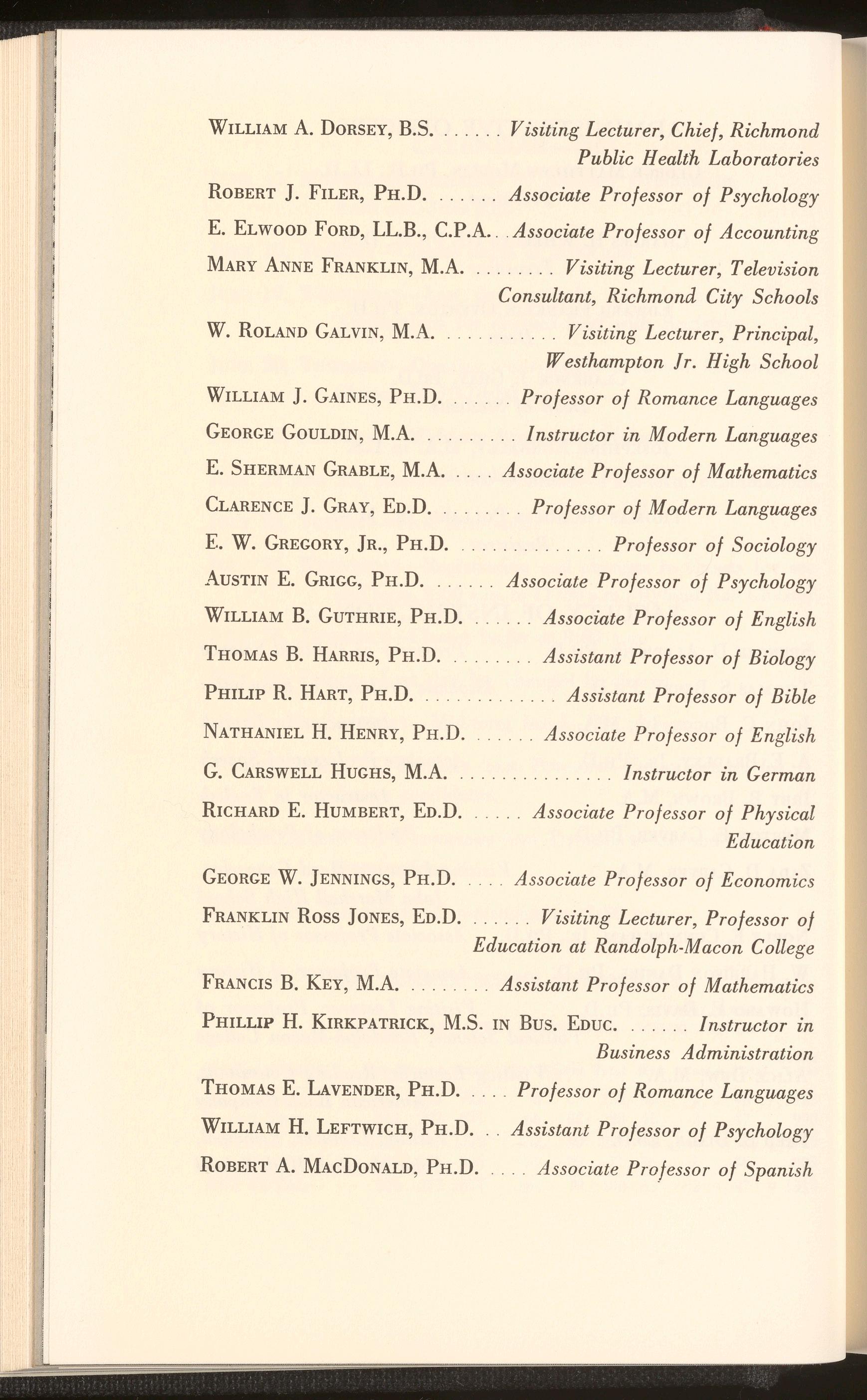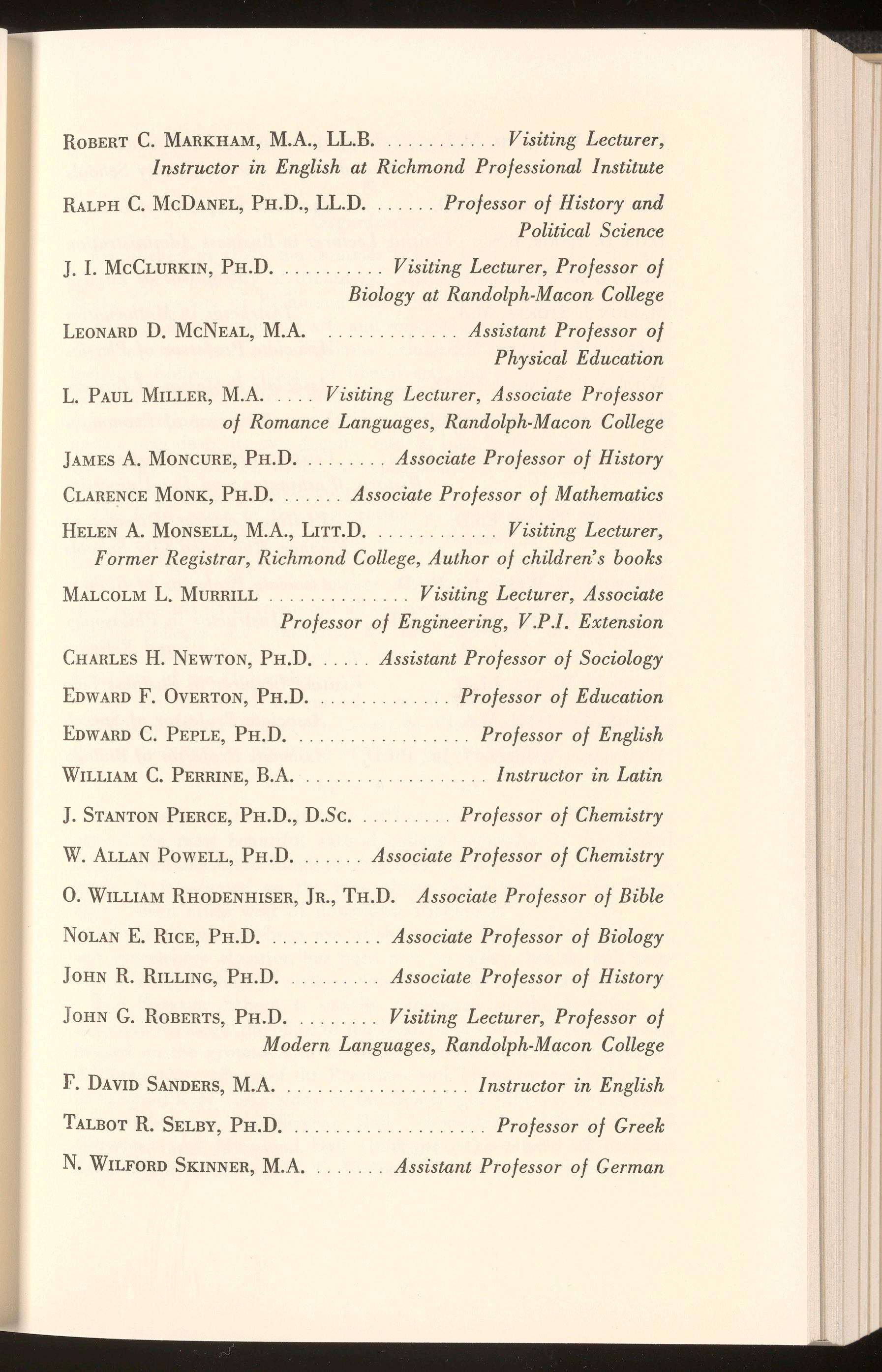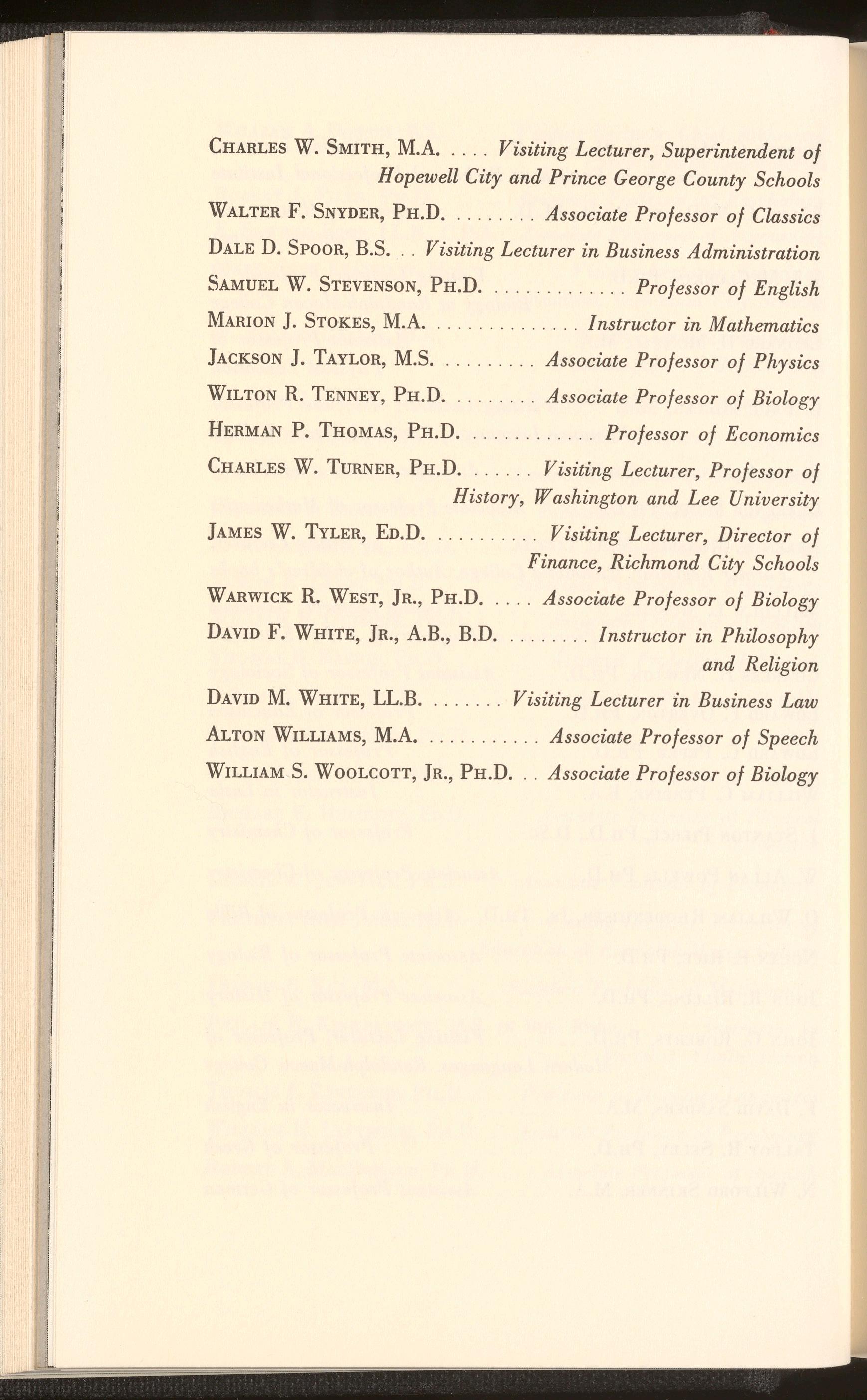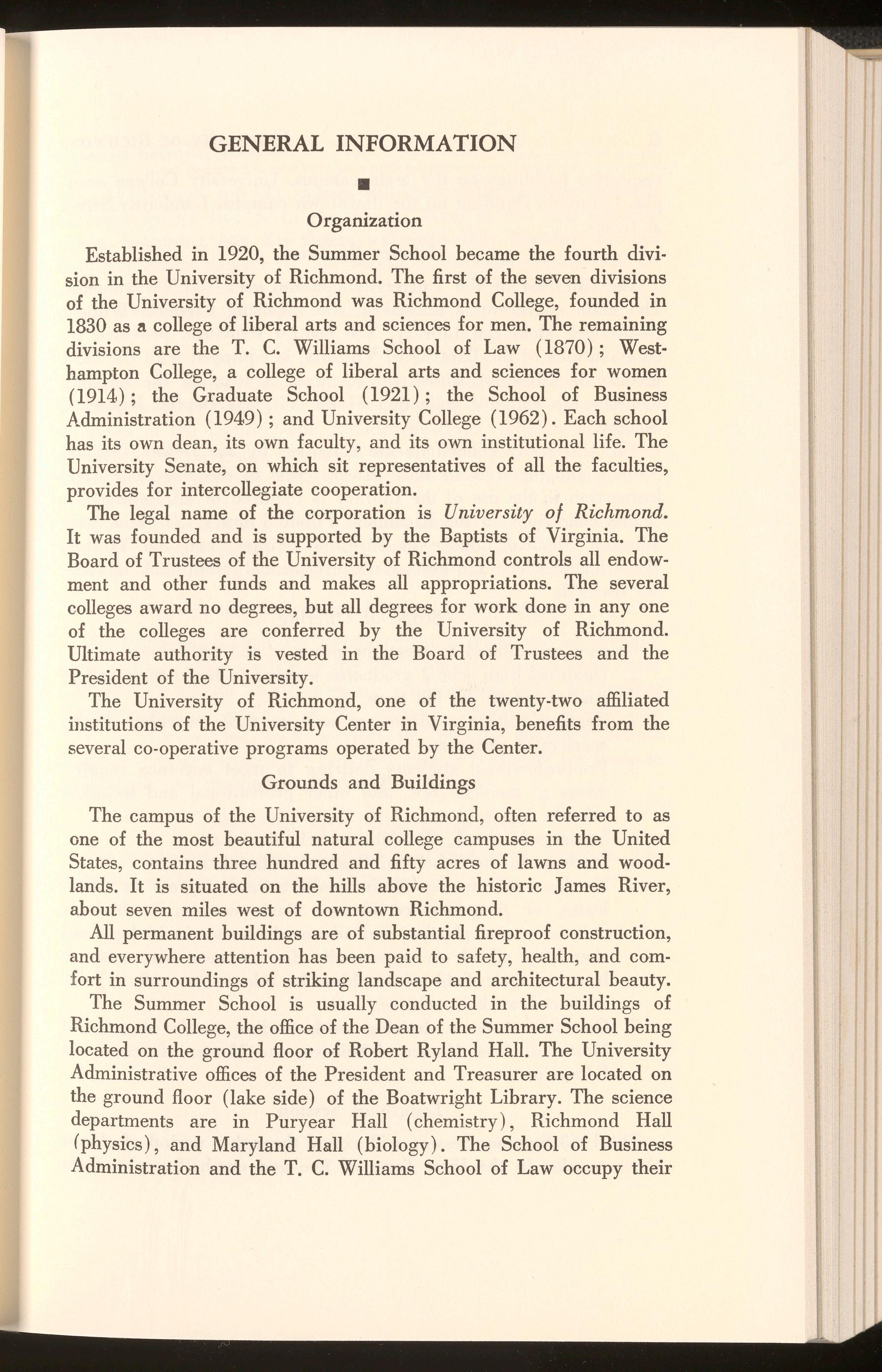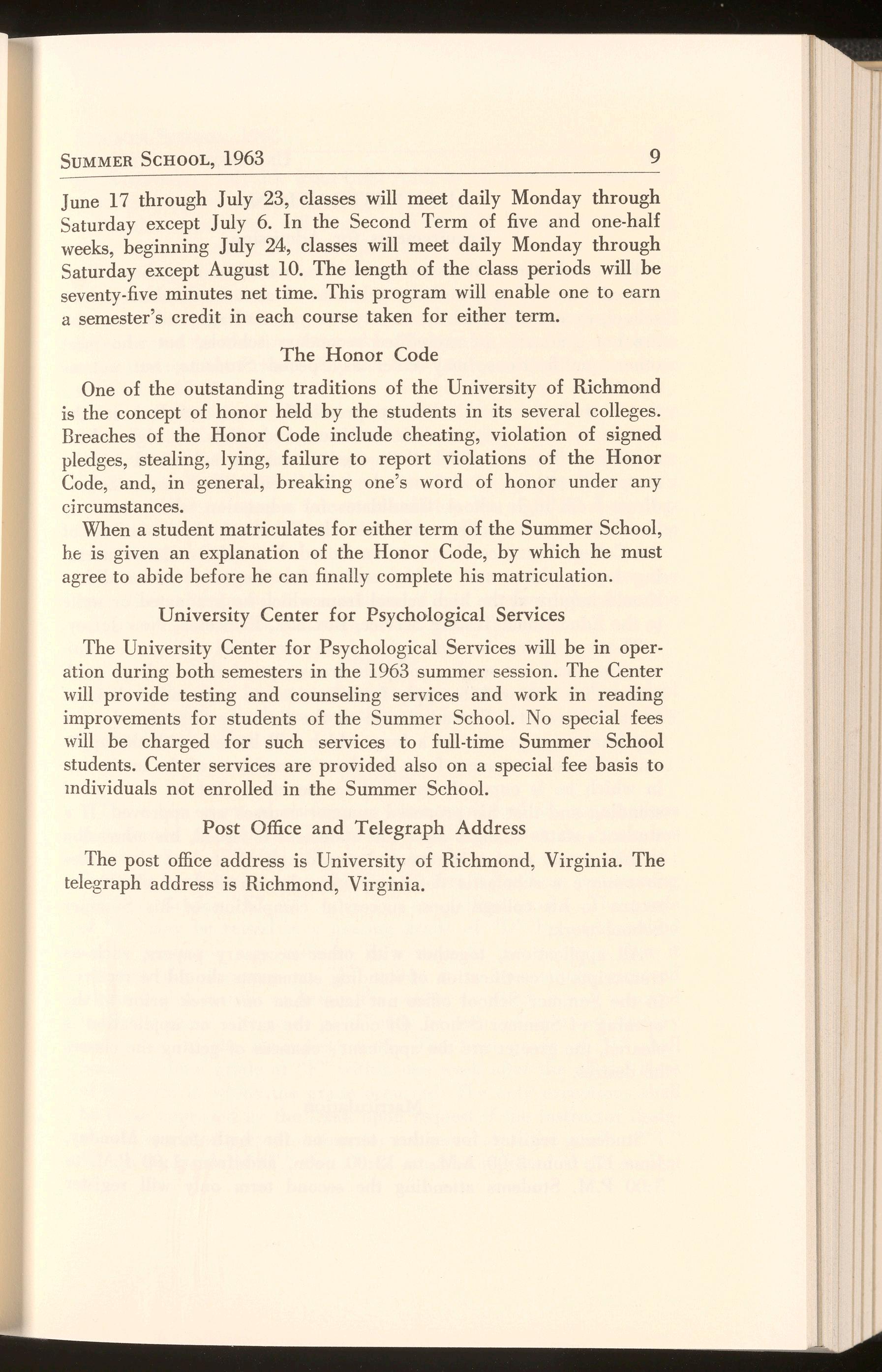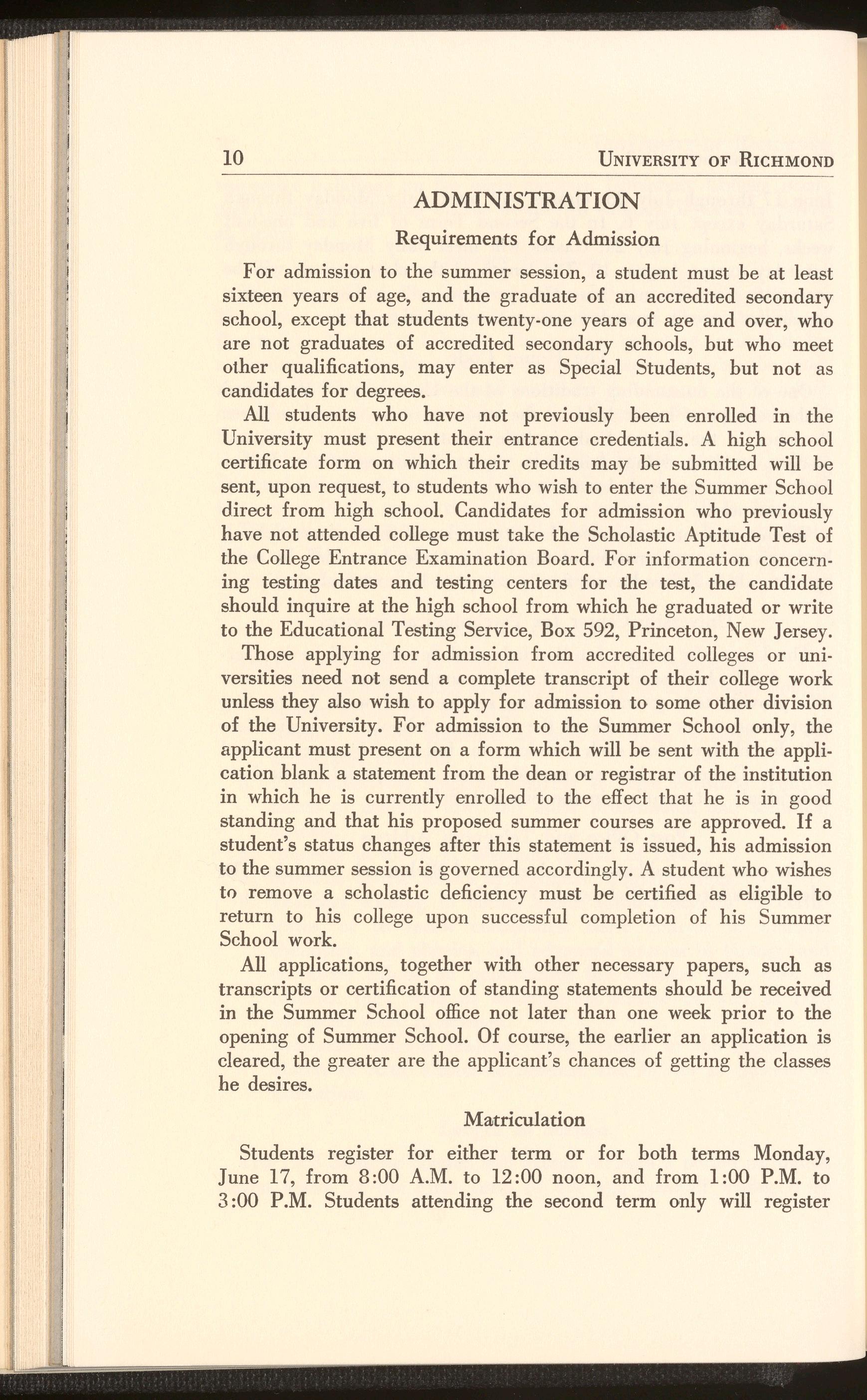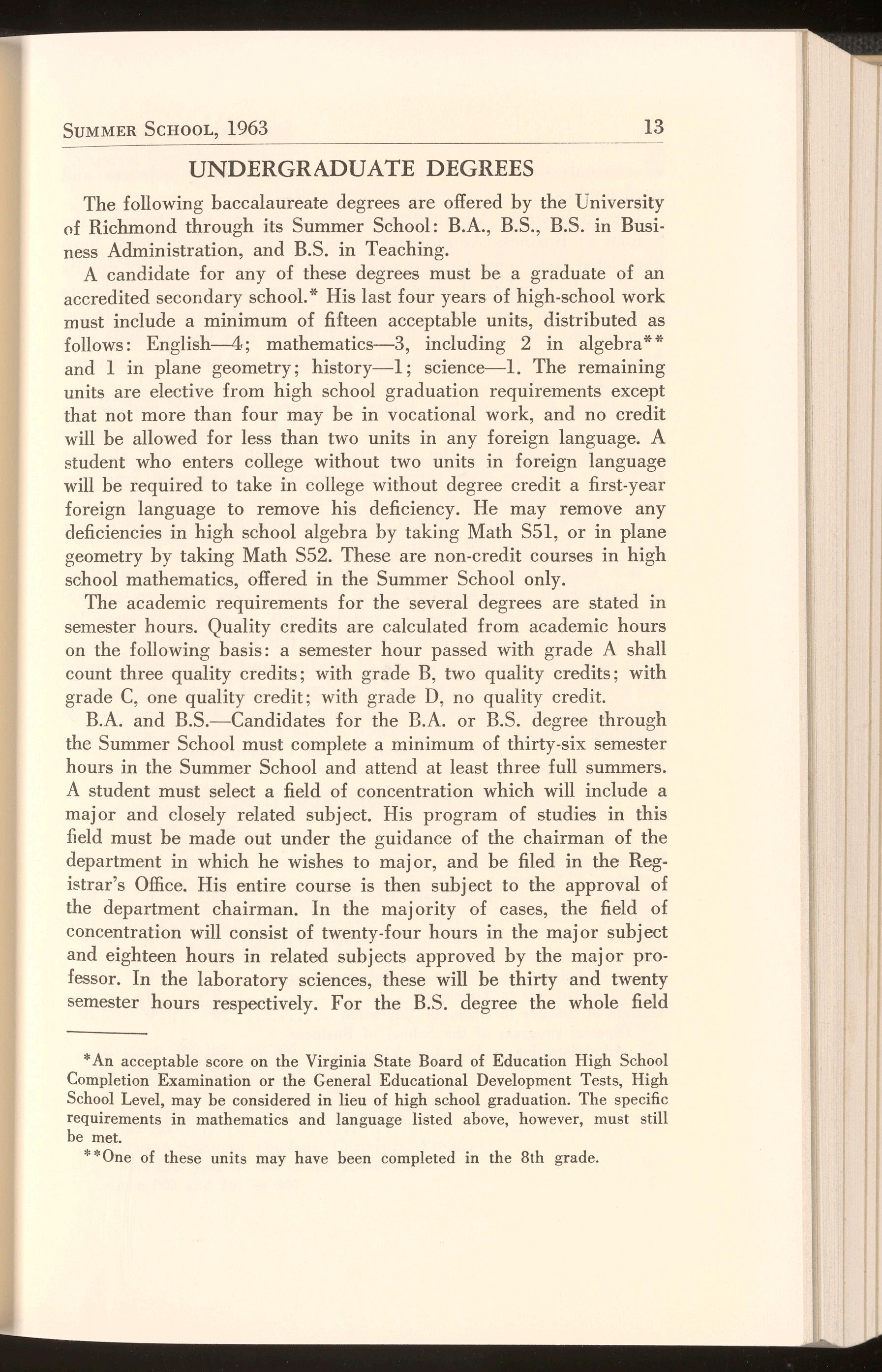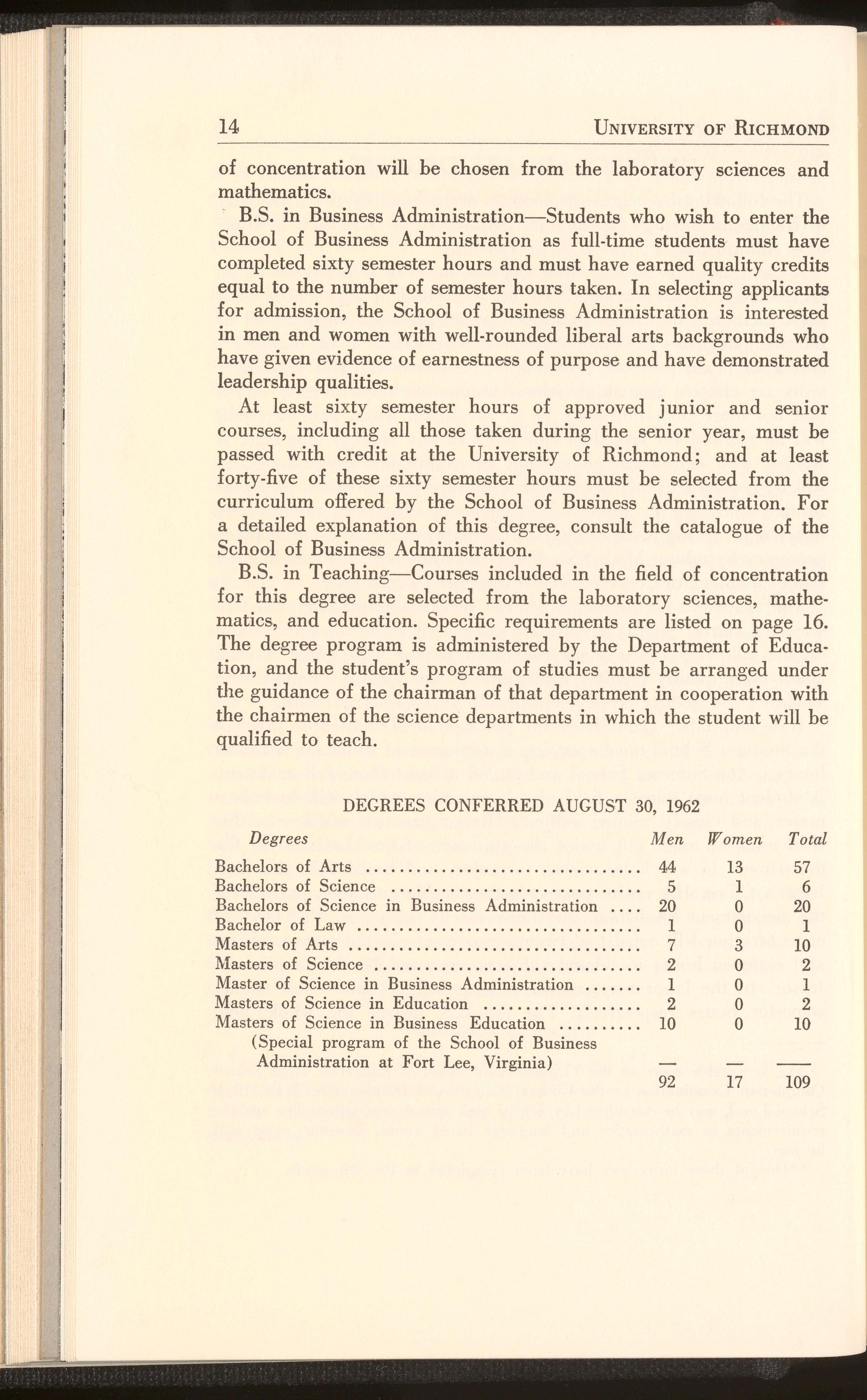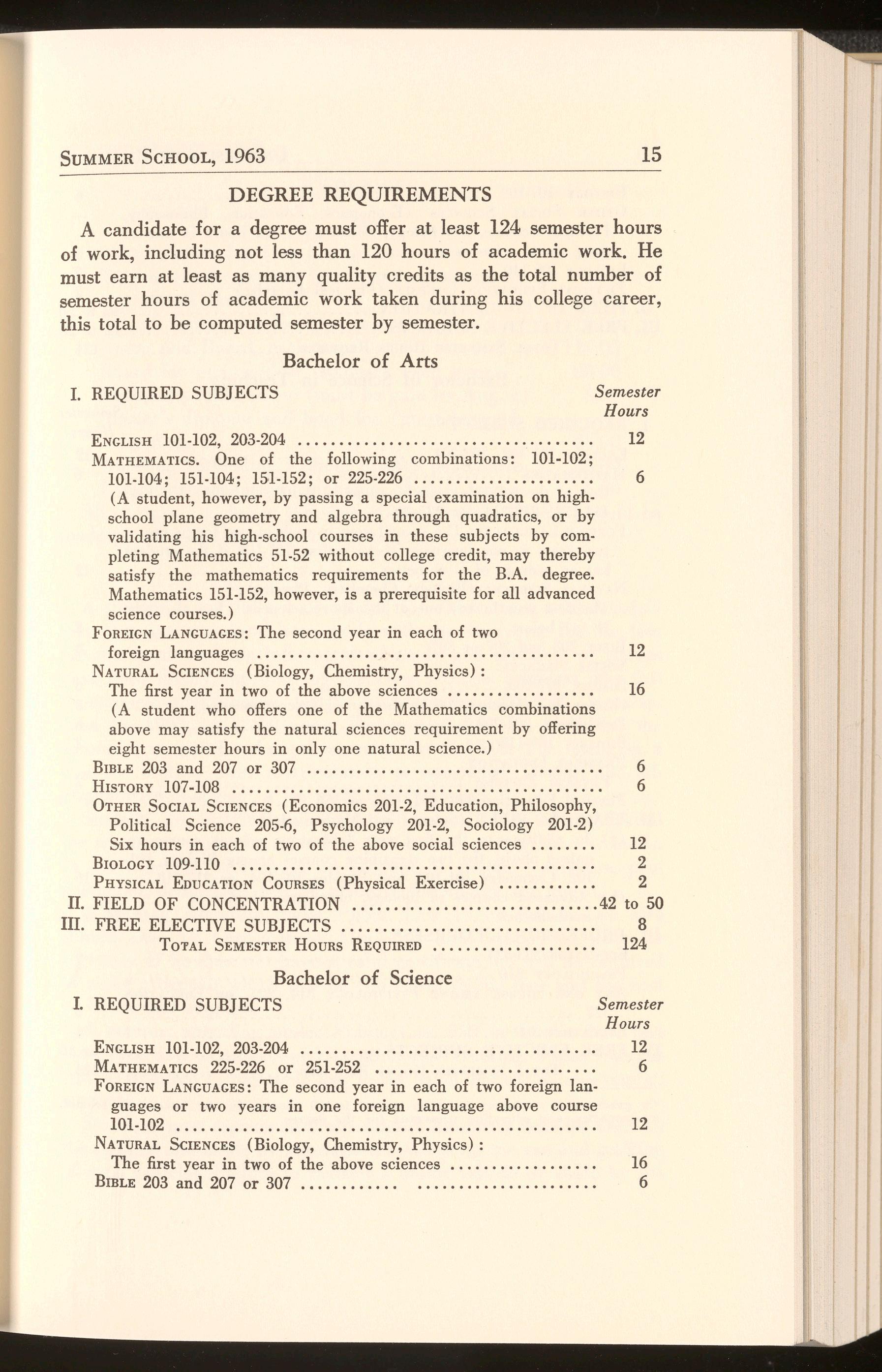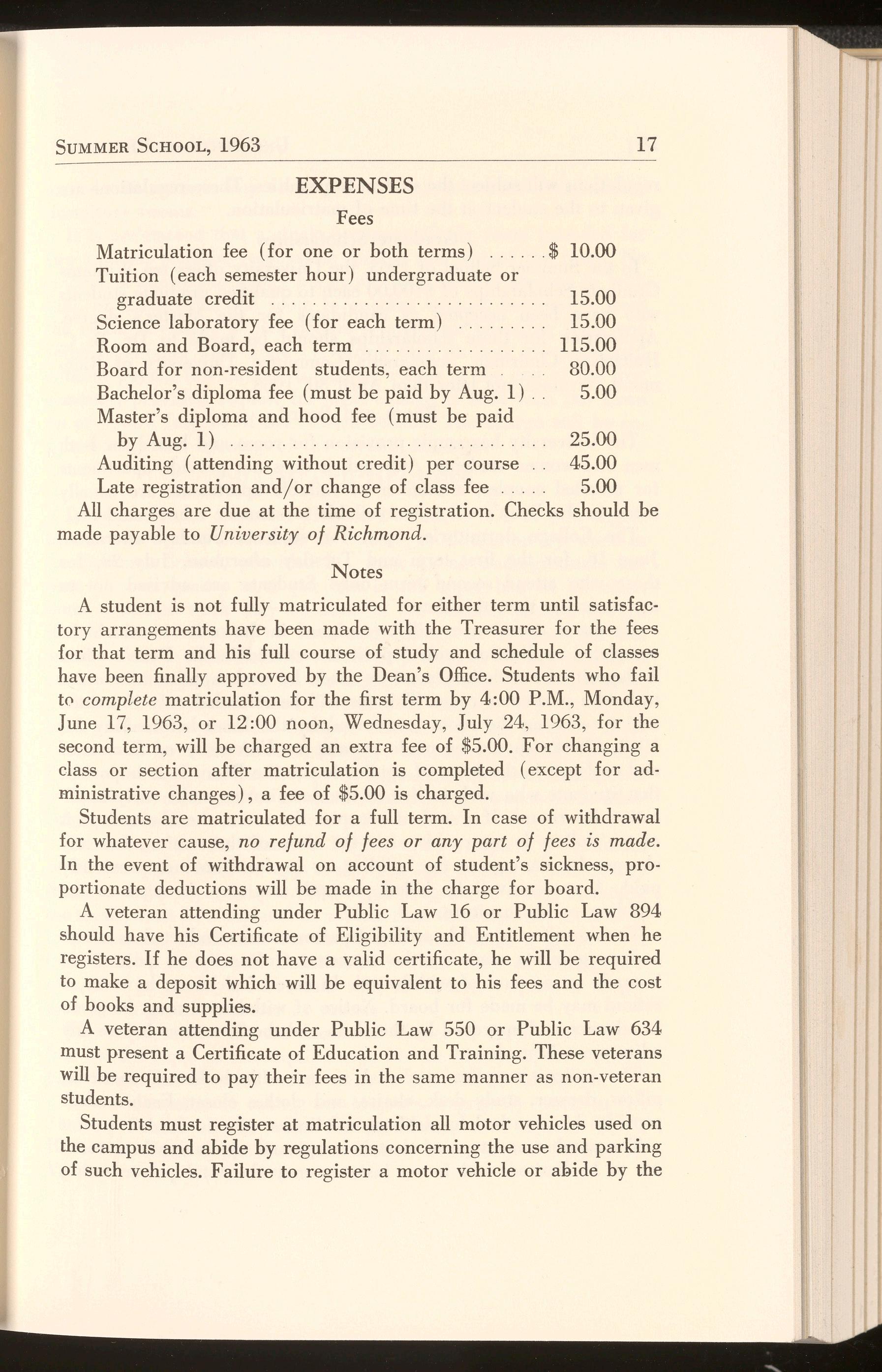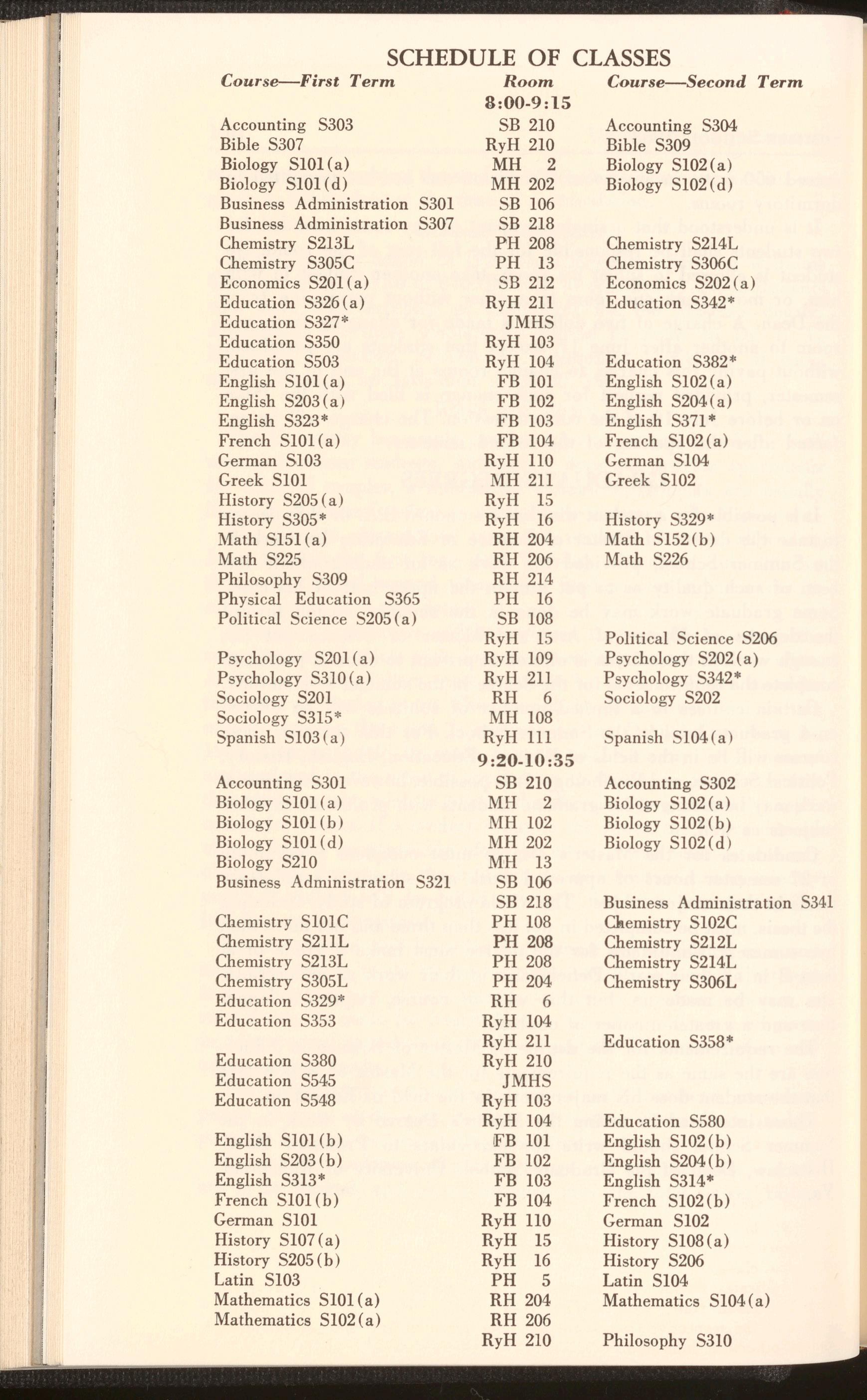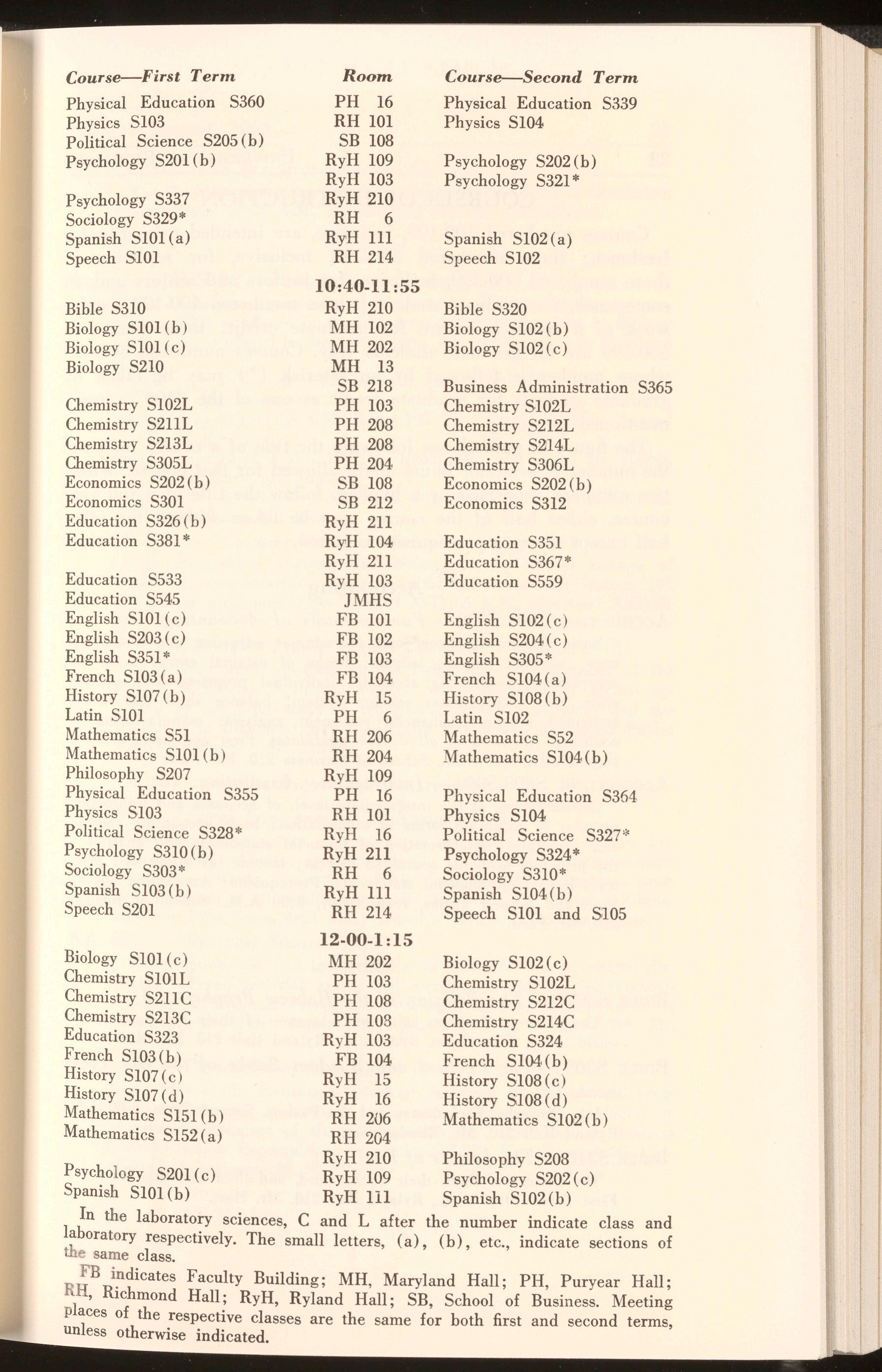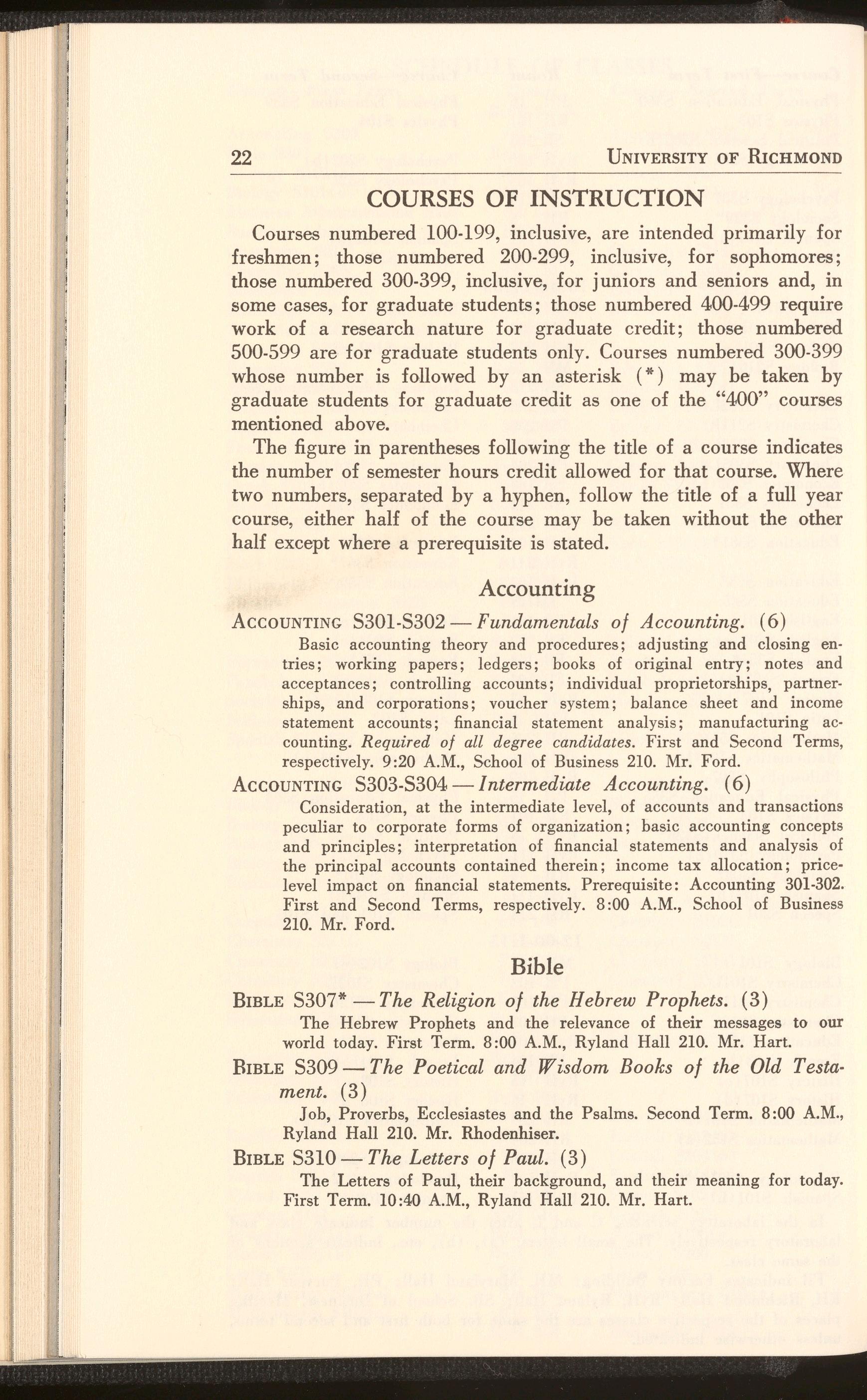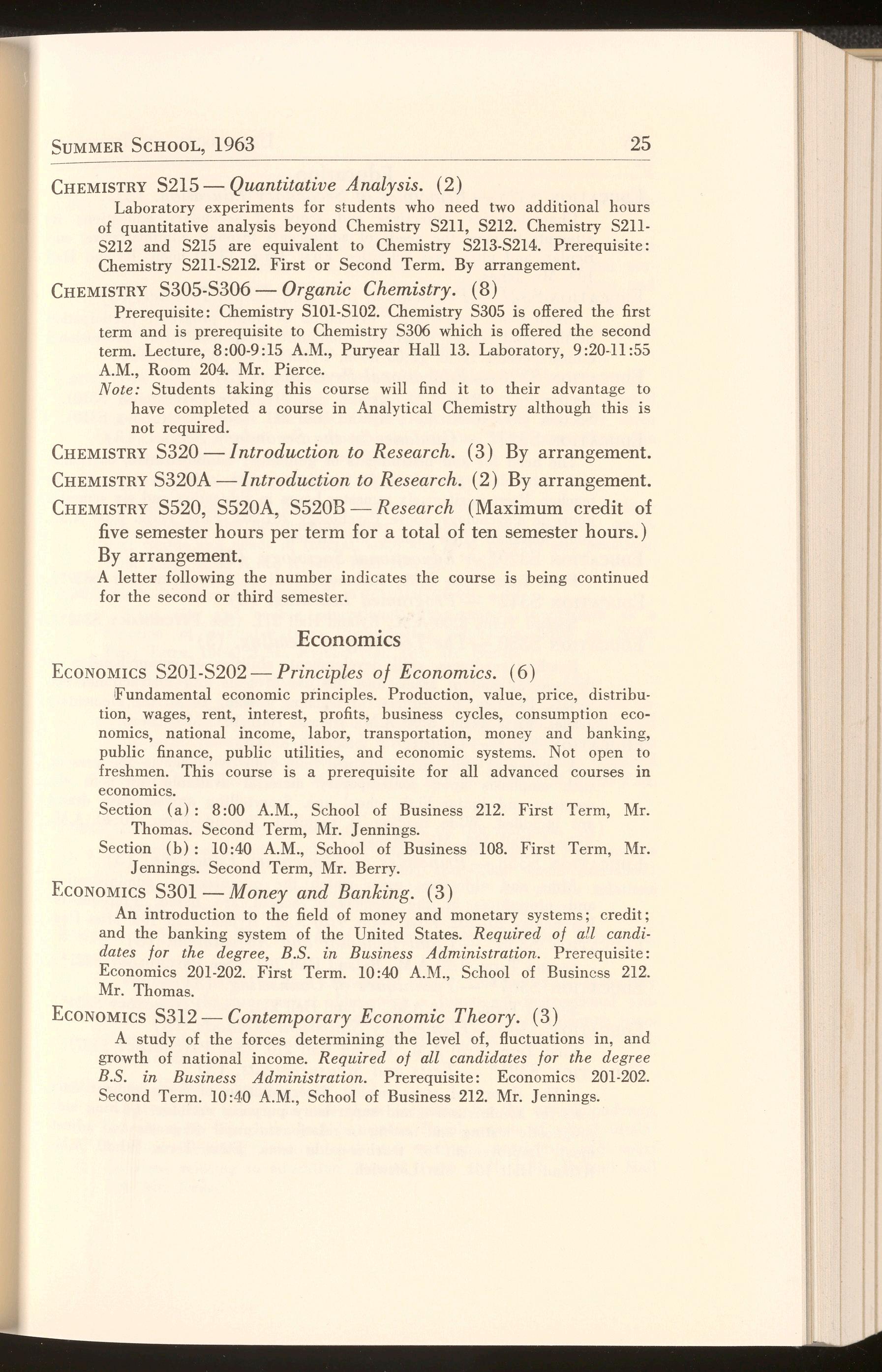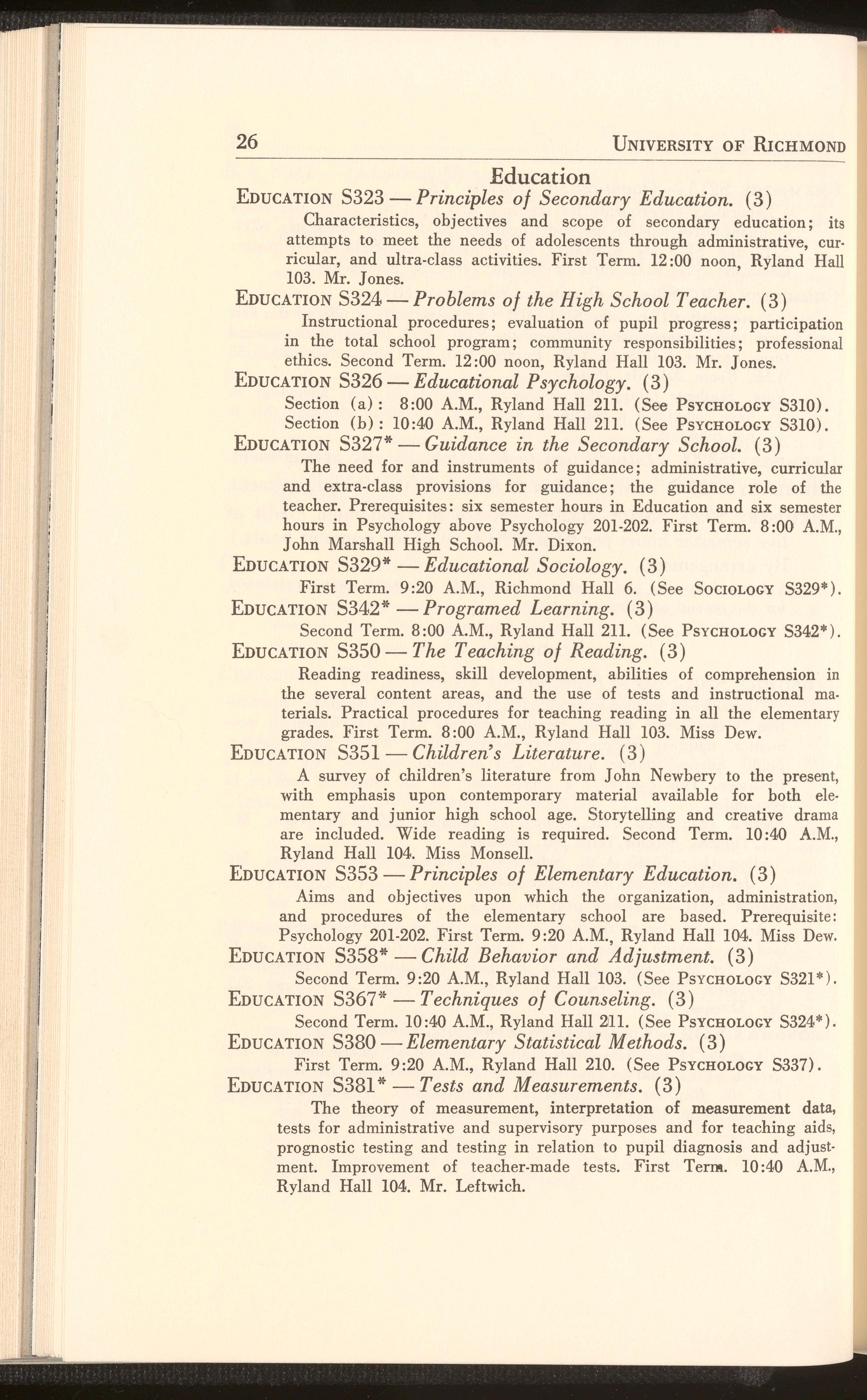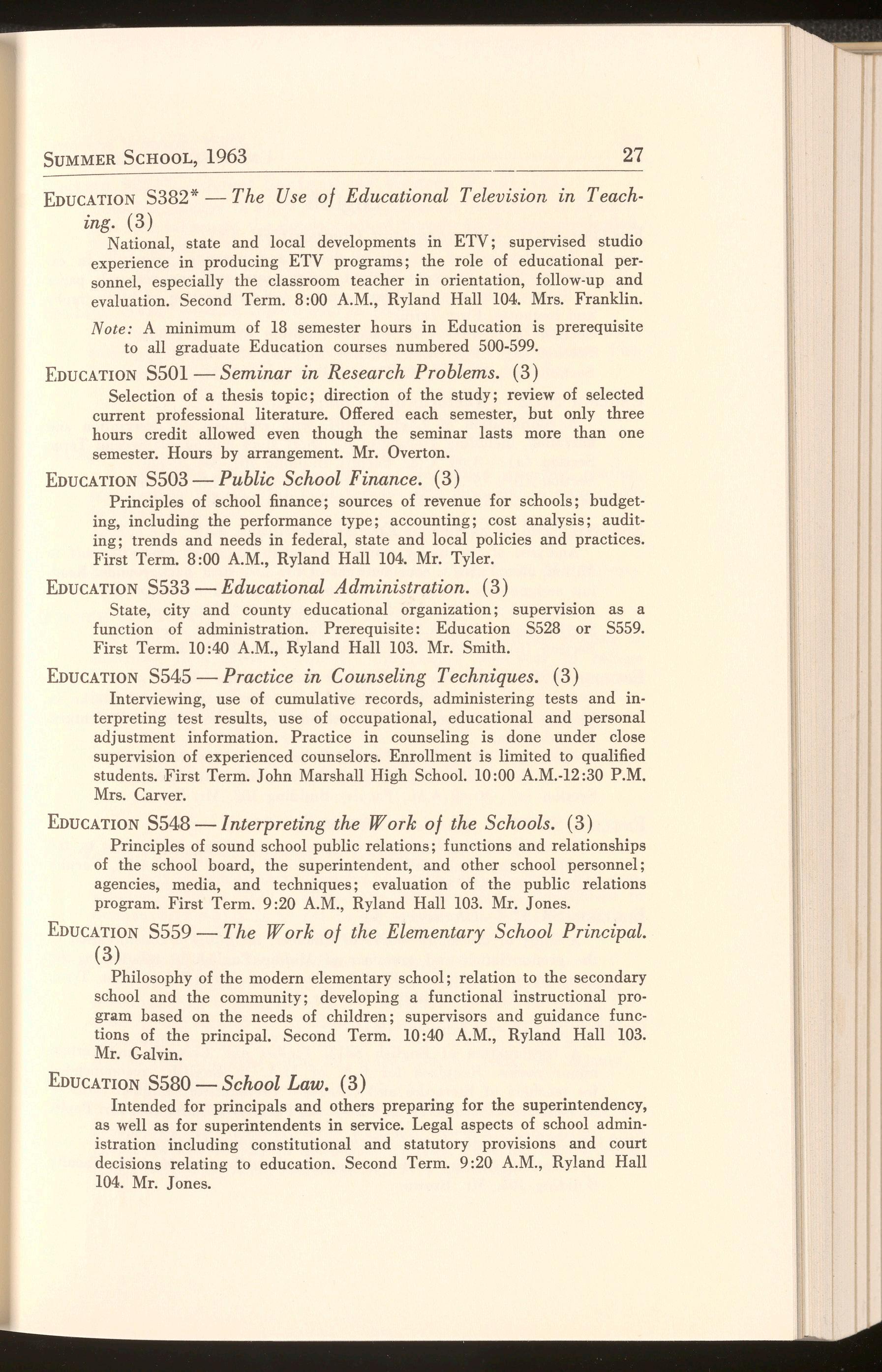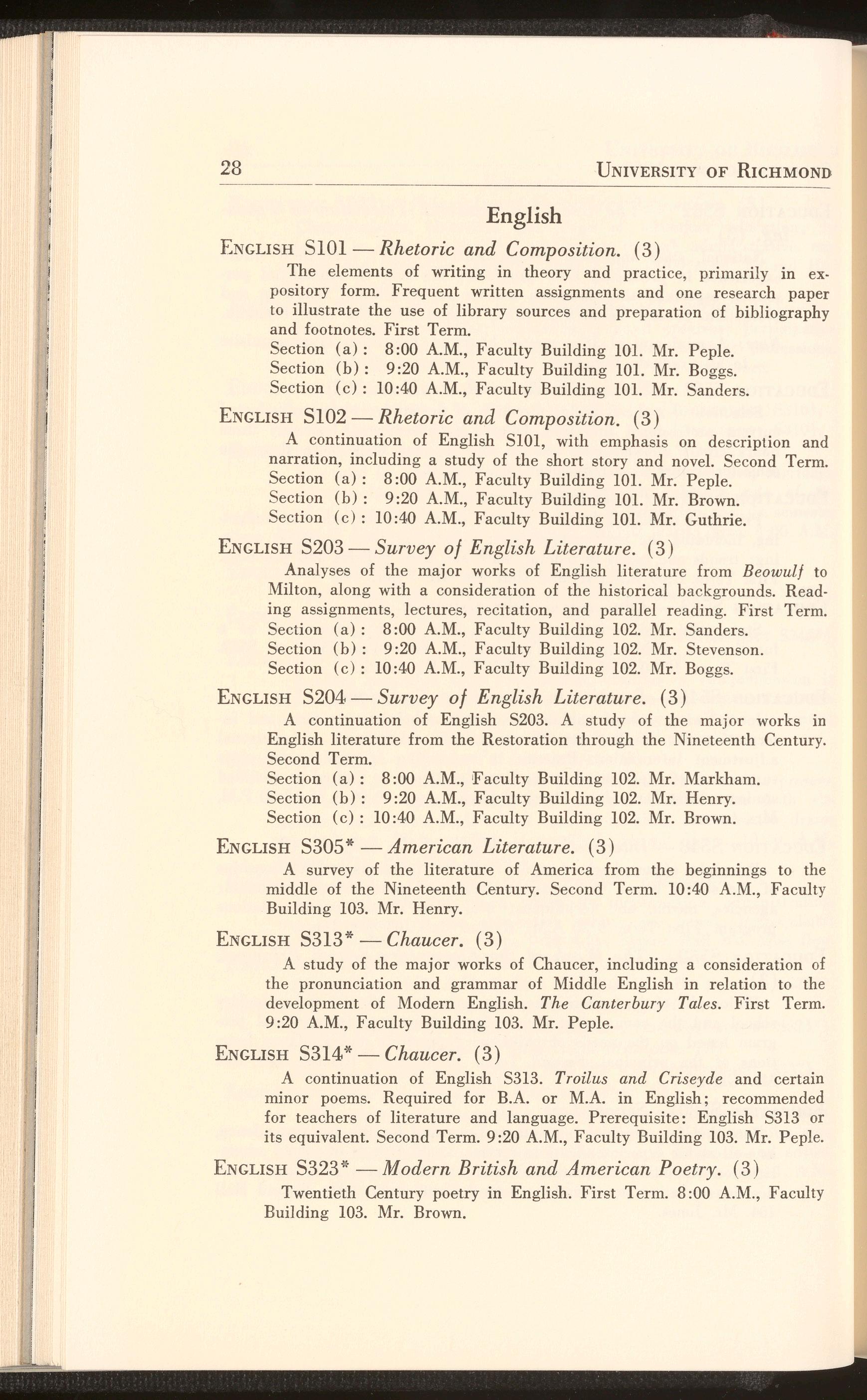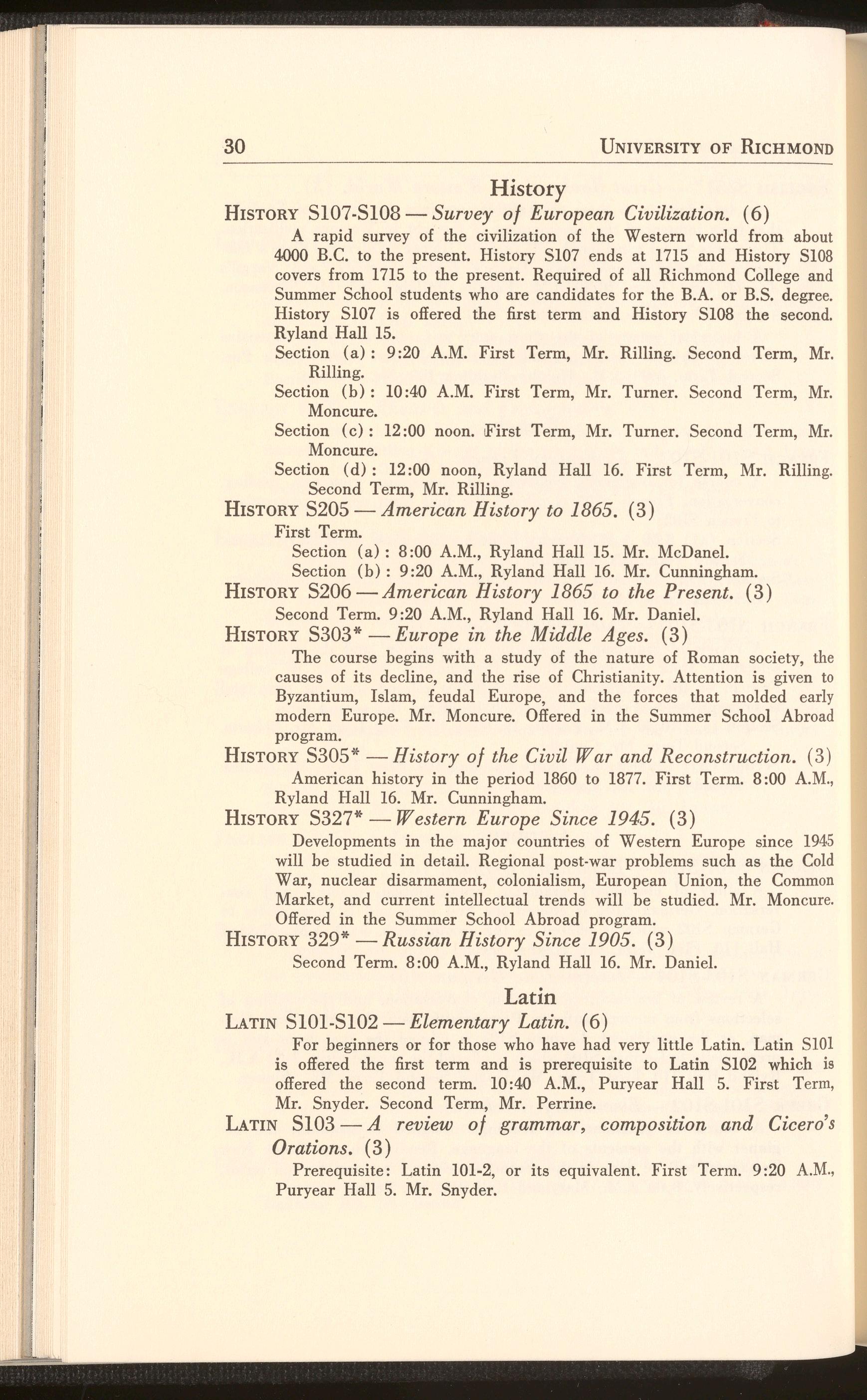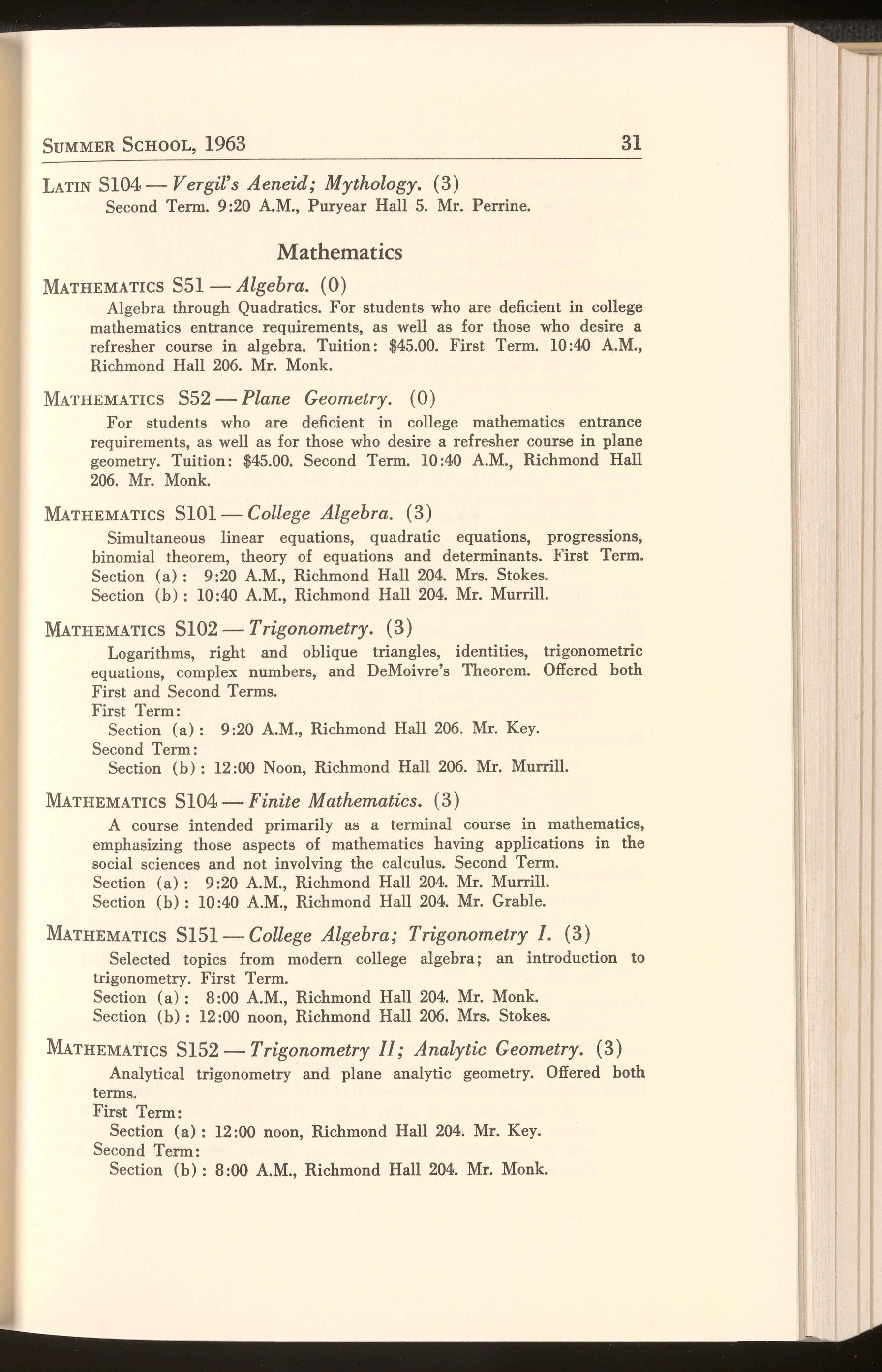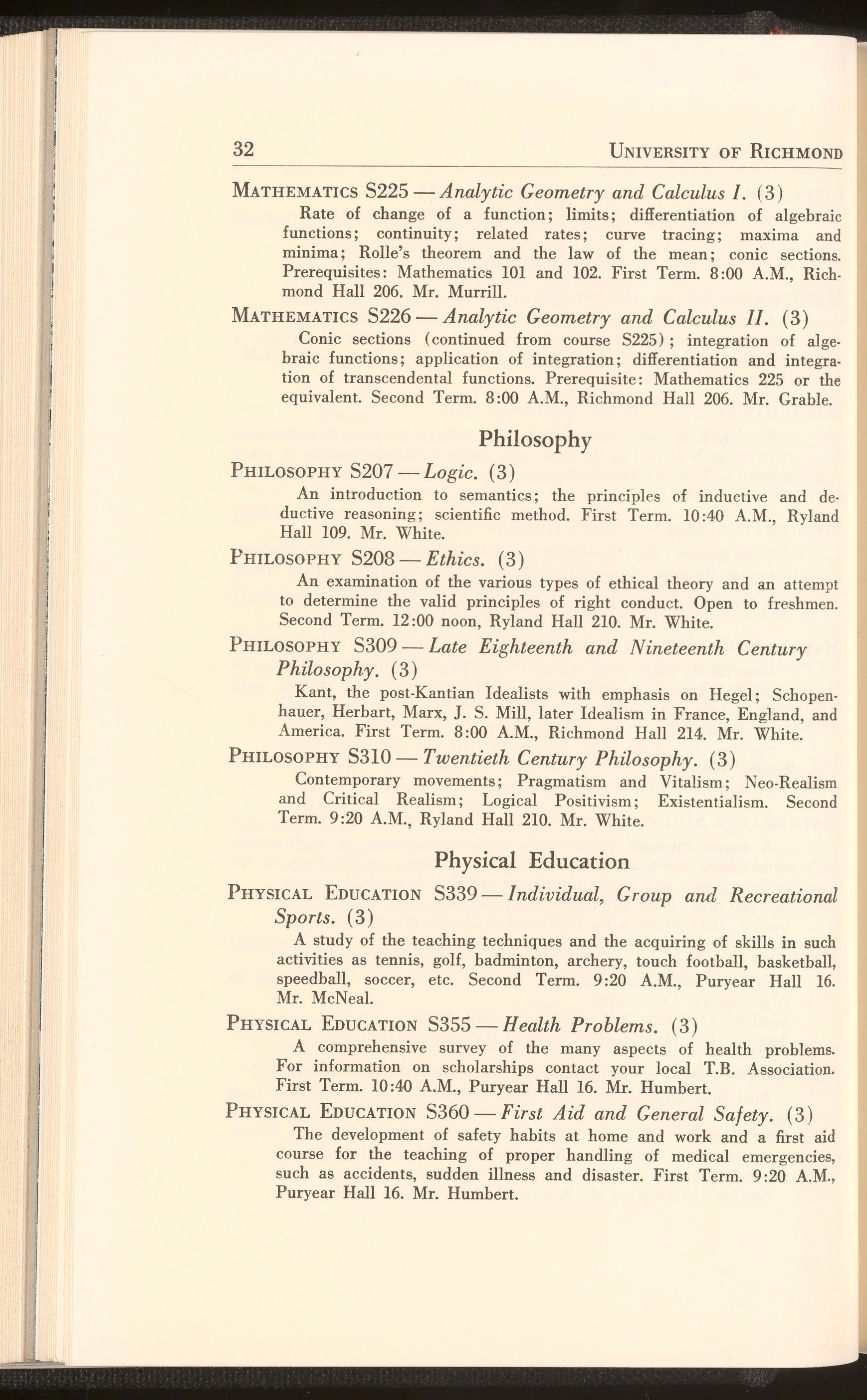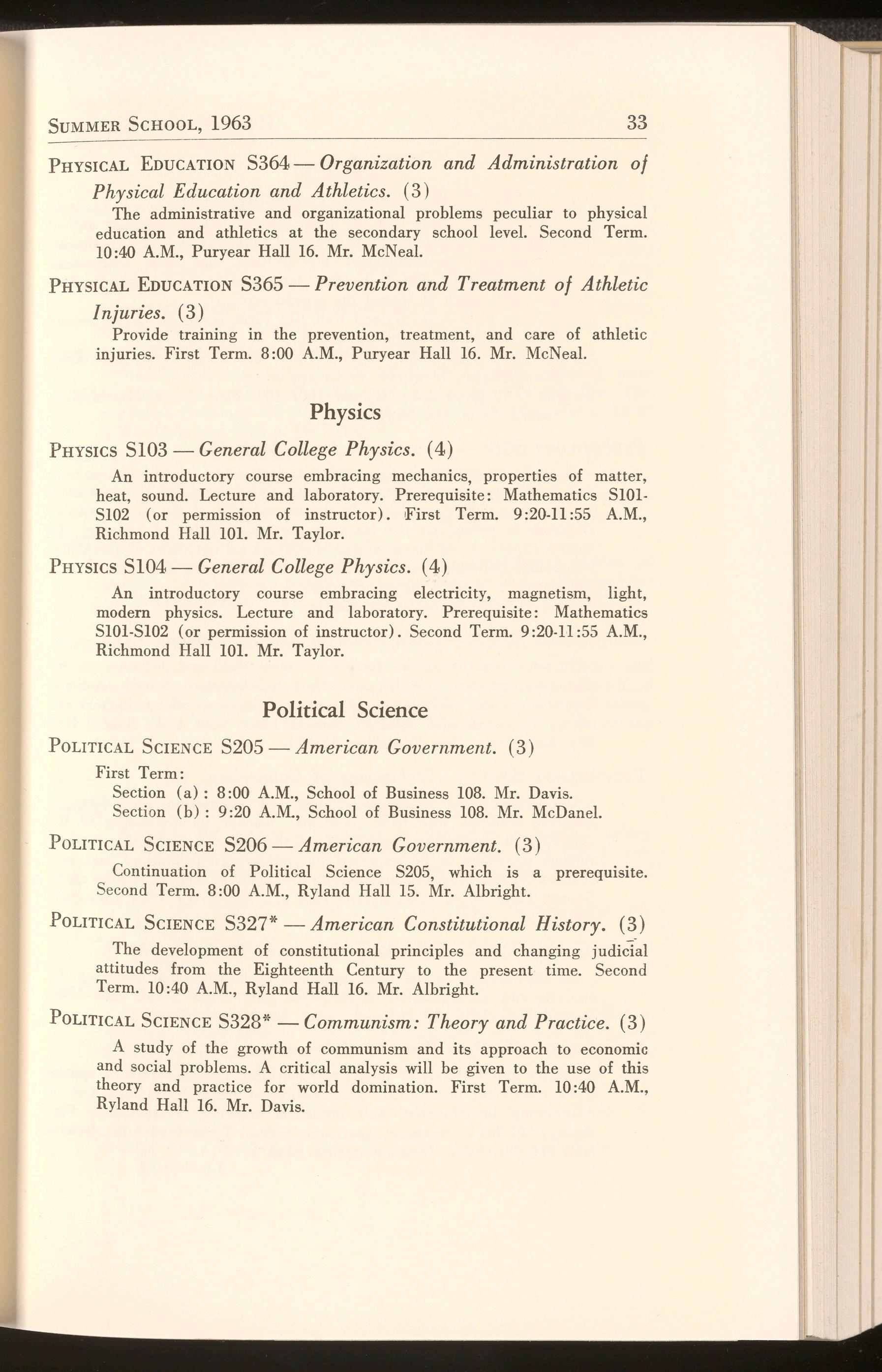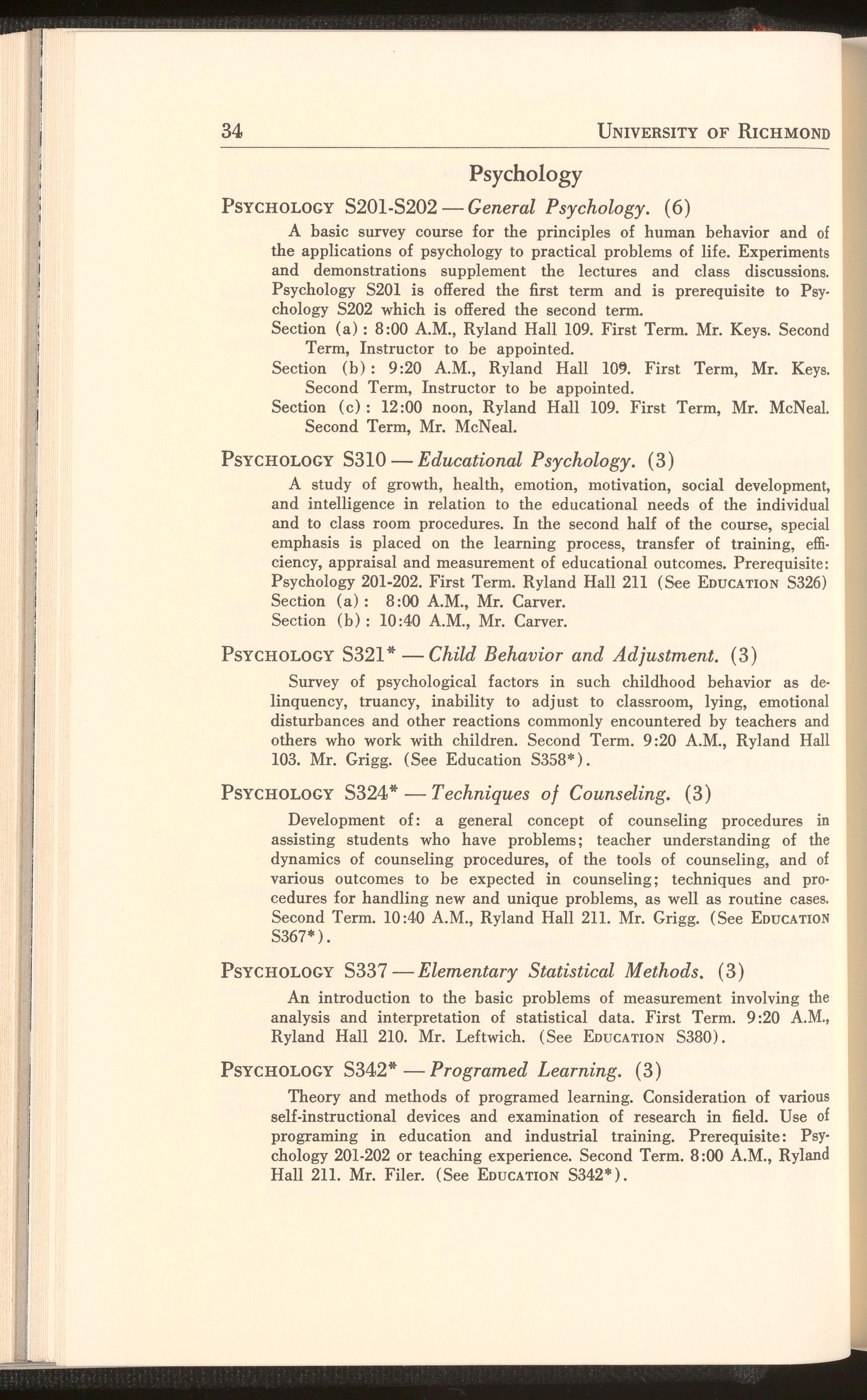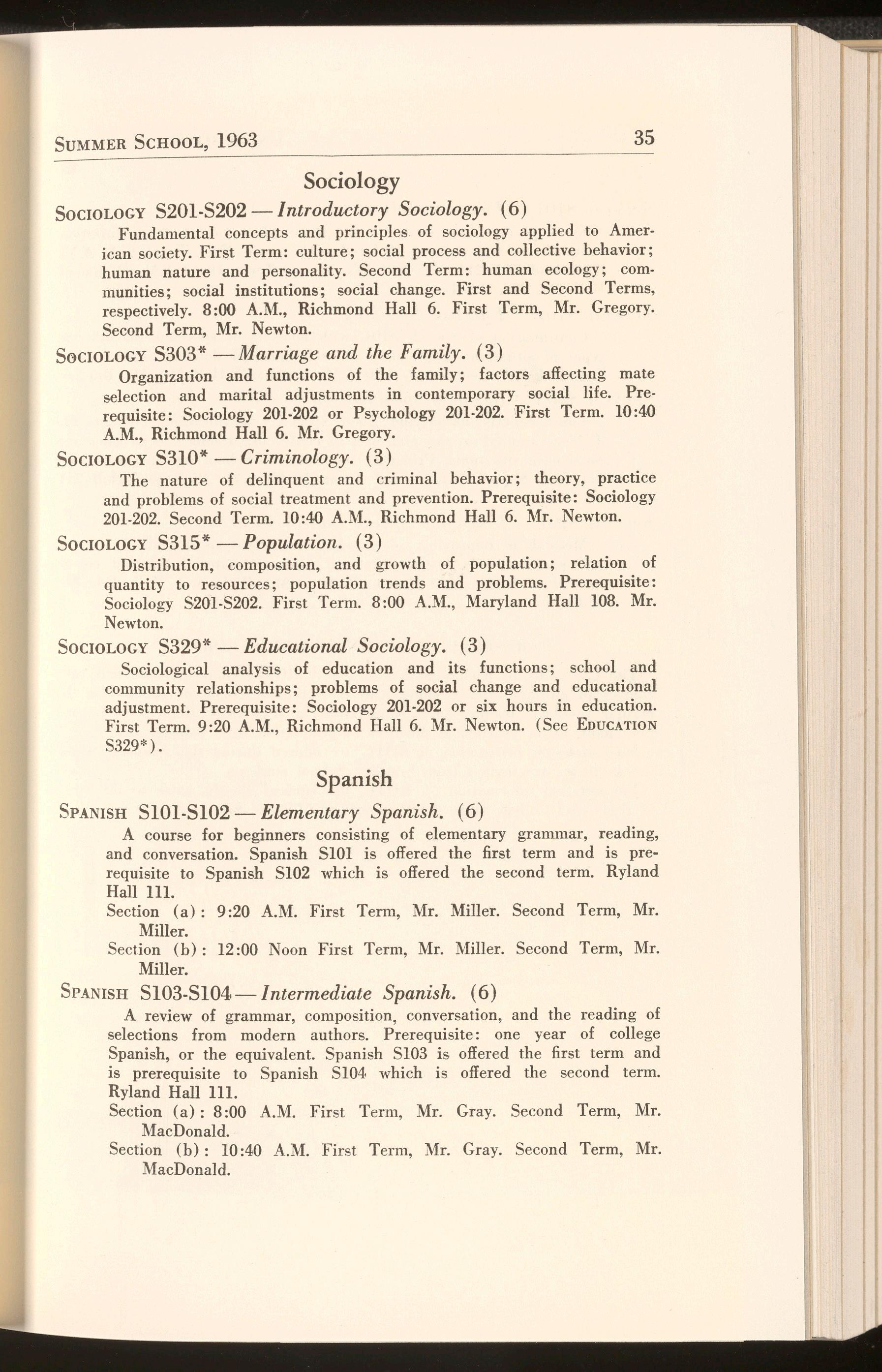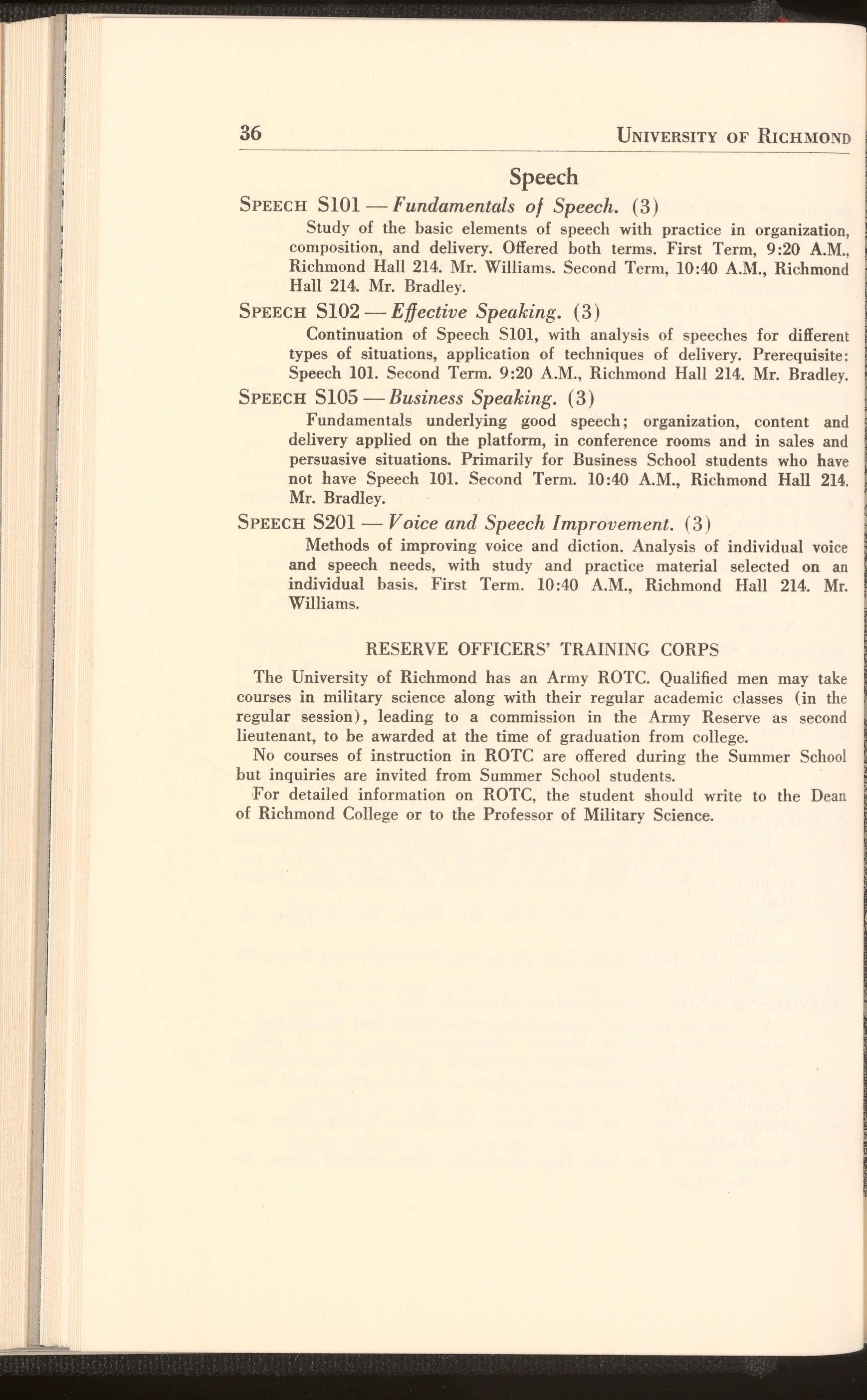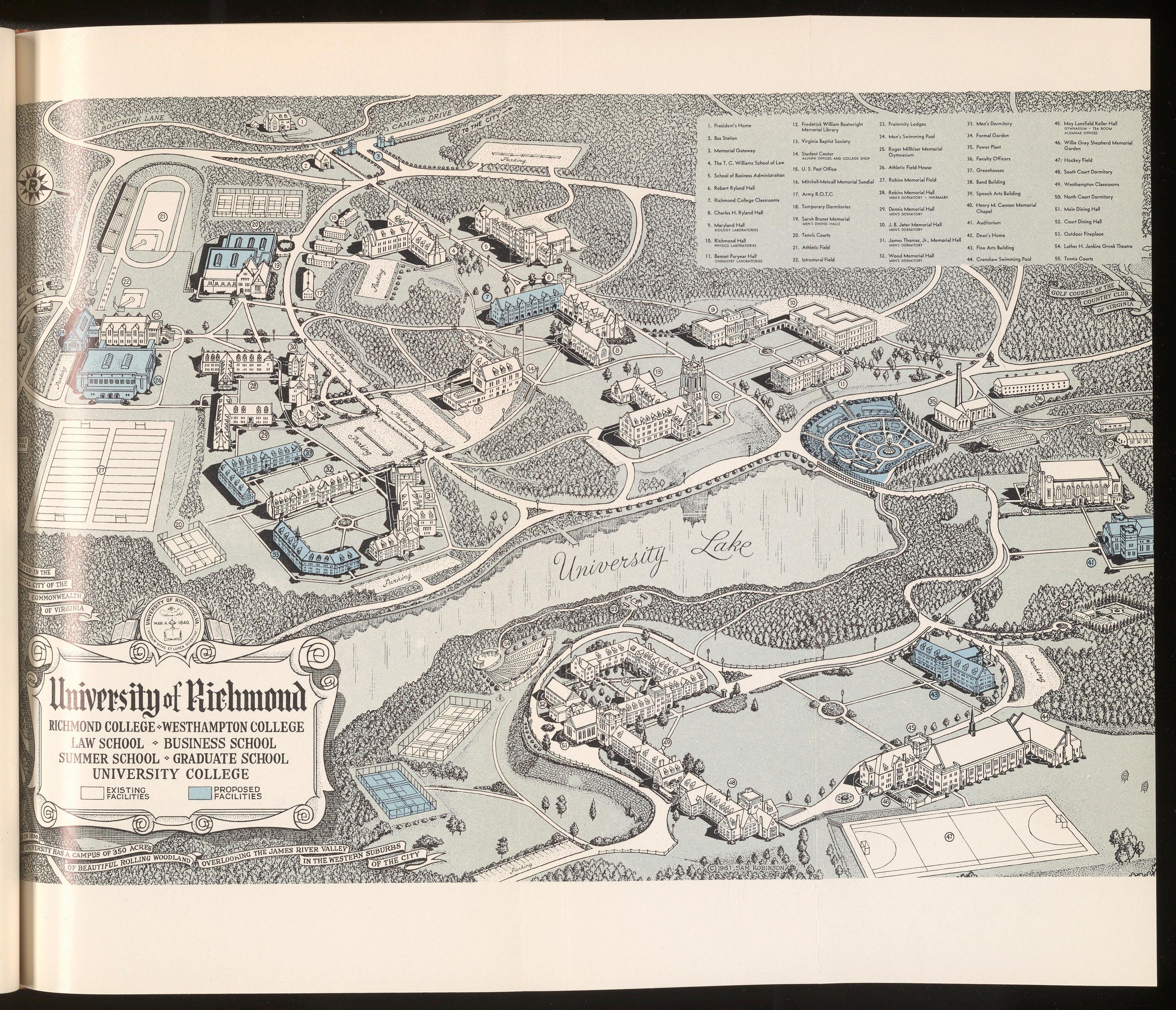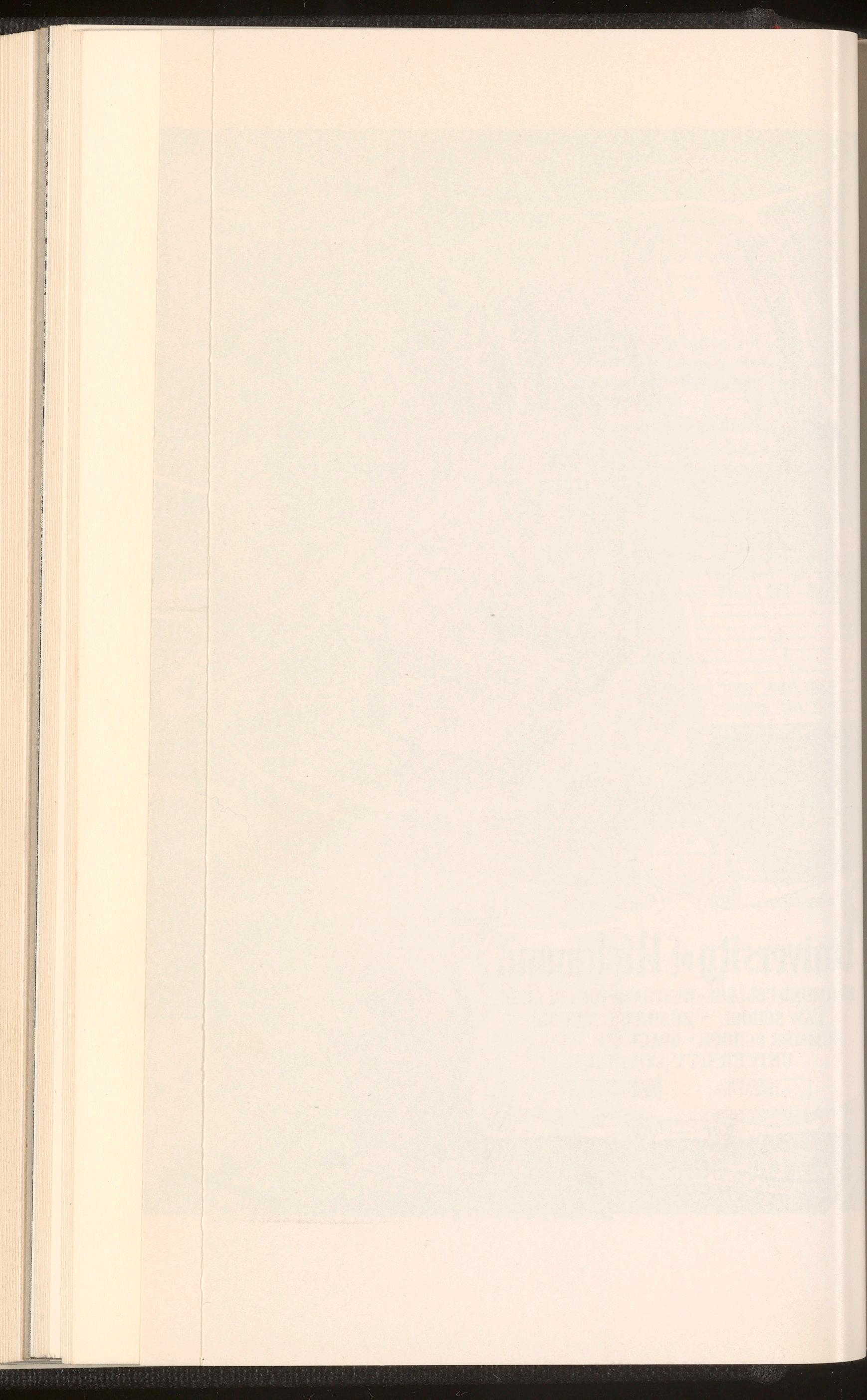Summer School Catalogue
June 17 to August 29
First Term: June 17-July 23
Second Term: July 24-August 29
UNIVERSITY of RICHMOND
VIRGINIA
1963
CALENDAR-1963
JUNE 17, MONDAY-Registration in Millhiser Gymnasium, 8:00 a.m.-3:00 p.m.
JUNE 18, TUESDAY-Classes begin at 8:00 a.m.
JUNE 19, WEDNESDAY-Last day to make any change in classes. Applications for degrees filed with Registrar.
JUNE 20, THURSDAY-Opening convocation-Cannon Memorial Chapel, 10:10-10:50 a.m.
JULY 6, SATURDAY-Mid-term break-No classes.
JULY 22 AND23, MONDAYAND TUESDAY-First-term examinations.
JULY 23, TUESDAY-First term ends.
JULY 24, WEDNESDAY-Registration and changes in classes for second term, 8:00 a.m. to 11 :30 a.m., Ryland Hall Cloister.
JULY 25, THURSDAY-Classes begin at 8:00 a.m.
JULY 26, FRIDAY-Last day for changes in classes.
AUGUST10, SATURDAY - Mid-term break-No classes.
AUGUST26 AND27, MONDAYAND TUESDAY-Examinations for degree candidates.
AUGUST28 AND29, WEDNESDAYANDTHURSDAY-Second-term examinations.
AUGUST29, THURSDAY-Commencement, 7 :30 p.m.
1962 SUMMER SCHOOL ENROLLMENT
ADMINISTRATIVE OFFICERS
GEORGE MATTHEWS MODLIN, PH.D., LL.D. President
CHARLES H. WHEELER III, PH.D., D.Sc. Treasurer
EDWARD FRANKLIN OVERTON, PH.D. Dean
CLARENCE J. GRAY, ED.D. Dean of Students
JosEPHINE NUNNALLY, M.A. in L.S. Acting Librarian
THOMAS NICHOLAS POLLARD, JR., M.A. Registrar
FACULTY OF INSTRUCTION
SPENCER D. ALBRIGHT, PH.D • . . ... . Professor of Political Science
THOMAS s. BERRY, PH.D •
JOHN C. BOGGS, JR., M.A.
A. E. BRADLEY, JR., PH.D.
IRBY B. BROWN, M.A •
MERTON E. CARVER, PH.D.
ZADA D. CARVER, M.A .
Associate Professor of Economics Instructor in English
Associate Professor of Speech Instructor in English Professor of Psychology
Visiting Lecturer, Head Counselor, John Marshall High School
NOBLE E. CUNNINGHAM, JR., PH.D •.. Associate Professor of History
W. HARRISON DANIEL, PH.D. Associate Professor of History
HOWARD E. DAVIS, PH.D • . .......
Visiting Lecturer, Professor of Political Science, Randolph-Macon College
ALICE DEW, M.A.
FRED B. D1xoN, ED.D. . .
Visiting Lecturer, Reading Consultant, American Book Company
Visiting Lecturer, Principal, John Marshall High School
WILLIAM A. DORSEY, B.S.
Visiting Lecturer, Chief, Richmond Public Health Laboratories
ROBERT J. FILER, PH.D . ..... Associate Professor of Psychology
E. ELWOOD FORD, LL.B., C.P.A. . Associate Professor of Accounting
MARY ANNE FRANKLIN, M.A.
W. ROLAND GALVIN, M.A.
Visiting Lecturer, Television Consultant, Richmond City Schools
Visiting Lecturer, Principal, Westhampton Jr. High School
WILLIAM J. GAINES, PH.D. Professor of Romance Languages
GEORGE GoULDIN, M.A. Instructor in Modern Languages
E. SHERMAN GRABLE, M.A. Associate Professor of Mathematics
CLARENCE J. GRAY, ED.D. Professor of Modern Languages
E. W. GREGORY, JR . , PH.D. Professor of Sociology
AUSTIN E. GRIGG, PH.D. Associate Professor of Psychology
WILLIAM B. GUTHRIE, PH.D. Associate Professor of English
THOMAS B. HARRIS, PH.D. Assistant Professor of Biology
PHILIP R. HART, PH.D. Assistant Professor of Bible
NATHANIEL H. HENRY, PH.D. Associate Professor of English
G. CARSWELL HUGHS, M.A.
RICHARD E. HUMBERT, ED.D. Instructor in German Associate Professor of Physical Education
GEORGE W. JENNINGS , PH.D. Associate Professor of Economics
FRANKLIN Ross JONES, ED.D. Visiting Lecturer, Professor of Education at Randolph-Macon College
FRANCIS B. KEY, M.A. Assistant Professor of Mathematics
PHILLIP H. KIRKPATRICK, M.S. IN Bus. EDuc. Instructor in Business Administration
THOMAS E. LAVENDER, PH.D. Professor of Romance Languages
WILLIAM H. LEFTWICH, PH.D. Assistant Professor of Psychology
ROBERT A. MACDONALD, PH.D. Associate Professor of Spanish
RoBERT C. MARKHAM, M.A., LL.B.
Visiting Lecturer, Instructor in English at Richmond Professional Institute
RALPH C. McDANEL, PH.D., LL.D •...... Professor of History and Political Science
J. I. McCLURKIN, PH.D.
Visiting Lecturer, Professor of Biology at Randolph-Macon College
LEONARD D. McNEAL, M.A. Assistant Professor of Physical Education
L. PAUL MILLER, M.A. Visiting Lecturer, Associate Professor of Romance Languages, Randolph-Macon College
JAMES A. MONCURE, PH.D.
CLARENCE MONK, PH.D.
Associate Professor of History Associate Professor of Mathematics
HELEN A. MoNSELL, M.A., LITT.D. . . . Visiting Lecturer, Former Registrar, Richmond College, Author of children's books
MALCOLM L. MURRILL
Visiting Lecturer, Associate Professor of Engineering, V.P.I. Extension
CHARLES H. NEWTON, PH.D.
EDWARD F. OVERTON, PH.D.
EDWARD C. PEPLE, PH.D •...
WILLIAM C. PERRINE, B.A .
J. STANTON PIERCE, PH.D., D.Sc.
Assistant Professor of Sociology Professor of Education Professor of English Instructor in Latin Professor of Chemistry
W. ALLAN POWELL, PH.D •.. Associate Professor of Chemistry
0. WILLIAM RHoDENHISER, JR., TH.D. Associate Professor of Bible
NOLAN E. RICE, PH.D •...
JoHN R. RILLING, PH.D.
Associate Professor of Biology Associate Professor of History
foHN G. RoBERTS, PH.D. Visiting Lecturer, Professor of Modern Languages, Randolph-Macon College
F. DAVID SANDERS, M.A. .
TALBOT R. SELBY, PH.D •...
Instructor in English
N. WILFORD SKINNER, M.A. Professor of Greek Assistant Professor of German
CHARLES W. SMITH, M.A • .. . . Visiting Lecturer, Superintendent of Hopewell City and Prince George County Schools
WALTER F. SNYDER, PH.D • Associate Professor of Classics
DALE D. SPOOR , B.S. . . Visiting Lecturer in Business Administration
SAMUEL W. STEVENSON, PH.D • .. Professor of English
MARION J. STOKES, M.A.
JACKSON J. TAYLOR, M.S.
WILTON R. TENNEY, PH.D.
HERMAN P. THOMAS, PH.D. .
CHARLES w. TUR NER, PH.D
Instructor in Mathematics
Associate Prof essor of Physics
Associate Prof essor of Biolo gy Professor of Economics
Visiting Le cturer, Professor of History, Washin g ton and Lee University
JAMES W. TYLER, Eo.D. Vi si-ting L ecturer, Director of Finance, Richmond City Schools
WARWICK R. WEST, JR., PH.D . Associate Professor of Biology
DAVID F. WHITE, JR., A.B., B.D •. Instru ctor in Philosophy and Religion
DAVID M. WHITE, LL.B... ..... Visiting Lecturer in Business Law
ALTON WILLIAMS, M.A • ..... Associate Professor of Speech
WILLIAMS. WooLCOTT , JR. , PH.D • Associate Professor of Biology
SUMMER SCHOOL, 1963 9
June 17 through July 23, classes will meet daily Monday through Saturday except July 6. In the Second Term of five and one -half weeks, beginning July 24, classes will meet daily Monday through Saturday except August 10. The length of the class periods will be seventy-five minutes net time. This program will enable one to earn a semester's credit in each course taken for either term.
The Honor Code
One of the outstanding traditions of the University of Richmond is the concept of honor held by the students in its several colleges. Breaches of the Honor Code include cheating, violation of signed pledges, stealing, lying, failure to report violations of the Honor Code, and, in general, breaking one's word of honor under any circumstances.
When a student matriculates for either term of the Summer School, he is given an explanation of the Honor Code, by which he must agree to abide before he can finally complete his matriculation.
University Center for Psychological Services
The University Center for Psychological Services will be in operation during both semesters in the 1963 summer session. The Center will provide testing and counseling services and work in reading improvements for students of the Summer School. No special fees will be charged for such services to full-time Summer School students. Center services are provided also on a special fee basis to mdividuals not enrolled in the Summer School.
Post Office and Telegraph Address
The post office address is University of Richmond, Virginia. The telegraph address is Richmond, Virginia.
ADMINISTRATION
Requirements for Admission
For admission to the summer session, a student must be at least sixteen years of age, and the graduate of an accredited secondary school, except that students twenty-one years of age and over, who are not graduates of accredited secondary schools, but who meet other qualifications, may enter as Special Students, but not as candidates for degrees.
All students who have not previously been enrolled in the University must present their entrance credentials. A high school certificate form on which their credits may be submitted will be sent, upon request, to students who wish to enter the Summer School direct from high school. Candidates for admission who previously have not attended college must take the Scholastic Aptitude Test of the College Entrance Examination Board. For information concerning testing dates and testing centers for the test, the candidate should inquire at the high school from which he graduated or write to the Educational Testing Service, Box 592, Princeton, New Jersey. Those applying for admission from accredited colleges or universities need not send a complete transcript of their college work unless they also wish to apply for admission to some other division of the University. For admission to the Summer School only, the applicant must present on a form which will be sent with the application blank a statement from the dean or registrar of the institution in which he is currently enrolled to the effect that he is in good standing and that his proposed summer courses are approved. If a student's status changes after this statement is issued, his admission to the summer session is governed accordingly. A student who wishes to remove a scholastic deficiency must be certified as eligible to return to his college upon successful completion of his Summer School work.
All applications, together with other necessary papers, such as transcripts or certification of standing statements should be received in the Summer School office not later than one week prior to the opening of Summer School. Of course, the earlier an application is cleared, the greater are the applicant's chances of getting the classes he desires.
Matriculation
Students register for either term or for both terms Monday, June 17, from 8:00 A.M. to 12:00 noon, and from 1:00 P.M. to 3 :00 P.M. Students attending the second term only will register
UNDERGRADUATE DEGREES
The following baccalaureate degrees are offered by the University of Richmond through its Summer School: B.A., B.S., B.S. in Business Administration, and B.S. in Teaching.
A candidate for any of these degrees must be a graduate of an accredited secondary school.* His last four years of high-school work must include a minimum of fifteen acceptable units, distributed as follows: English-4; mathematics-3, including 2 in algebra** and 1 in plane geometry; history-1; science-1. The remaining units are elective from high school graduation requirements except that not more than four may be in vocational work, and no credit will be allowed for less than two units in any foreign language. A student who enters college without two units in foreign language will be required to take in college without degree credit a first-year foreign language to remove his deficiency. He may remove any deficiencies in high school algebra by taking Math SSl, or in plane geometry by taking Math S52. These are non-credit courses in high school mathematics, offered in the Summer School only.
The academic requirements for the several degrees are stated in semester hours. Quality credits are calculated from academic hours on the following basis: a semester hour passed with grade A shall count three quality credits; with grade B, two quality credits; with grade C, one quality credit; with grade D, no quality credit.
B.A. and B.S.-Candidates for the B.A. or B.S. degree through the Summer School must complete a minimum of thirty-six semester hours in the Summer School and attend at least three full summers. A student must select a field of concentration which will include a major and closely related subject. His program of studies in this field must be made out under the guidance of the chairman of the department in which he wishes to major, and be filed in the Registrar's Office. His entire course is then subject to the approval of the department chairman. In the majority of cases, the field of concentration will consist of twenty-four hours in the major subject and eighteen hours in related subjects approved by the major professor. In the laboratory sciences, these will be thirty and twenty semester hours respectively. For the B.S. degree the whole field
*An acceptable score on the Virginia State Board of Education High School Completion Examination or the General Educational Development Tests, High School Level, may be considered in lieu of high school graduation. The specific requirements in mathematics and language listed above, however, must still be met.
**One of these units may have been completed in the 8th grade.
UNIVERSITY OF RICHMOND
of concentration will he chosen from the laboratory sciences and mathematics.
· B.S. in Business Administration-Students who wish to enter the School of Business Administration as full-time students must have completed sixty semester hours and must have earned quality credits equal to the number of semester hours taken. In selecting applicants for admission, the School of Business Administration is interested in men and women with well-rounded liberal arts backgrounds who have given evidence of earnestness of purpose and have demonstrated leadership qualities.
At least si xty semester hours of approved junior and senior courses, including all those taken during the senior year, must he passed with credit at the University of Richmond; and at least forty-five of these sixty semester hours must he selected from the curriculum offered by the School of Business Administration. For a detailed explanation of this degree, consult the catalogue of the School of Business Administration.
B.S. in Teachin g- Courses included in the field of concentration for this degree are selected from the laboratory sciences, mathematics, and education. Specific requirements are listed on page 16. The degree program is administered by the Department of Education , and the student's program of studies must he arranged under the guidance of the chairman of that department in cooperation with the chairmen of the science department s in which the student will he qualified to teach.
DEGREES CONFERRED AUGUST 30, 1962
SCHOOL, 1963 15
DEGREE
REQUIREMENTS
A candidate for a degree must offer at least 124 semester hours of work, including not less than 120 hours of academic work. He must earn at least as many quality credits as the total number of semester hours of academic work taken during his college career, this total to be computed semester by semester.
Bachelor of Arts
I. REQUIRED SUBJECTS
ENGLISH 101-102, 203-204
MATHEMATICS.One of the following combinations: 101-102; 101-104; 151-104; 15,1-152; or 225-226
(A student, however, by passing a special examination on highschool plane geometry and algebra through quadratics, or by validating his high -school courses in these subjects by completing Mathematics 51-52 without college credit, may thereby satisfy the mathematics r equirements for the B.A. degree. Mathemati cs 151-152, however, is a prerequisite for all advanced science courses.)
FOREIGNLANGUAGES:The second year in each of two foreign languages
NATURAL SCIENCES(Biology, Chemistry, Physics) : The first year in two of the above sciences
(A student who offers one of the Mathematics combinations above may satisfy the natural sciences requirement by offering eight semester hours in only one natural science )
BIBLE 203 and 207 or 307
HISTORY107-108
OTHERSocIAL SCIENCES(Economics 201-2, Education, Philosophy, Political Science 205-6, Psychology 201-2, Sociology 201-2) Six hours in each of two of the above social sciences
Semester Hours
12
6
12
16
6
12 BIOLOGY109-110
PHYSICALEDUCATIONCOURSES(Physical
III. FREE ELECTIVE SUBJECTS
To'l'AL SEMESTERHouRs REQUIRED.
Bachelor of Science
I. REQUIRED SUBJECTS
ENGLISH 101-102, 203-204
MATHEMATICS225-226 or 251-252
FOREIGNLANGUAGES:The second year in each of two foreign languages or two years in one foreign language above course 101-102
NATURALScIENCES (Biology, Chemistry, Physics) : The first year in two of the above sciences .................
BIBLE 203 and 207 or 307
UNIVERSITY OF RICHMOND
Philosophy,
101-102, 203-204
One of the following combinations: 101-102; 101-104; 151-104; 151-152; 213-214; or 225-226.
FOREIGNLANGUAGES:The second year in each of two languages or two years in one language above course 101-102 if the student has an average of C or better
NATURALSCIENCE: (Biology, Chemistry, Physics) : The first year in any one of the above sciences. (See also part II (a) below
II. TEACHING FIELD (Science and Mathematics)*
(a) In addition to the first year laboratory science course required above, the two remaining courses among Biology 101102, Chemistry 101-102, and Physics 103-104, or 217-218.... 16 (b) Advanced courses in biology, chemistry, physics or mathematics 14 or 16
III. PROFESSIONAL COURSES*
IV.
• A grade of C or better must be earned in all courses in the laboratory science. mathematics, and education presented for the degree.
EXPENSES
Fees
Matriculation fee ( for one or both terms)
Tuition ( each semester hour) undergraduate or graduate credit
Science laboratory fee (for each term) .
Room and Board, each term
Board for non-resident students, each term
Bachelor's diploma fee (must he paid by Aug. 1) .
Master's diploma and hood fee (must he paid by Aug. 1)
Auditing ( attending without credit) per course
Late registration and/or change of class fee
All charges are due at the time of registration. Checks should he made payable to University of Richmond.
Notes
A student is not fully matriculated for either term until satisfactory arrangements have been made with the Treasurer for the fees for that term and his full course of study and schedule of classes have been finally approved by the Dean's Office. Students who fail t0 complete matriculation for the first term by 4:00 P.M., Monday, June 17, 1963, or 12:00 noon, Wednesday, July 24 , 1963, for the second term, will he charged an extra fee of $5.00. For changing a class or section after matriculation is completed ( except for administrative changes), a fee of $5.00 is charged.
Students are matriculated for a full term. In case of withdrawal for whatever cause, no refund of fees or any part of fees is made. In the event of withdrawal on account of student's sickness, proportionate deductions will he made in the charge for hoard.
A veteran attending under Public Law 16 or Public Law 894 should have his Certificate of Eligibility and Entitlement when he registers. If he does not have a valid certificate, he will he required to make a deposit which will he equivalent to his fees and the cost of hooks and supplies.
A veteran attending under Public Law 550 or Public Law 634 must present a Certificate of Education and Training. These veterans will he required to pay their fees in the same manner as non-veteran students.
Students must register at matriculation all motor vehicles used on the campus and abide by regulations concerning the use and parking of such vehicles. Failure to register a motor vehicle or abide by the
UNIVERSITY OF RICHMOND
regulations will subject the student to penalties. These regulations are given to the student at the time of matriculation.
Graduate Scholarships
In the Summer School of 1963, the University offers ten Williams Graduate Scholarships of $100.00 each to qualified graduate students who have been accepted as candidates for the Master's degree. Application for these scholarships should be made to Dr. B. C. Holtzclaw, Chairman, Scholarship Committee, University of Richmond, Virginia, not later than April 30, 1963.
Room and Board
The University has ample provision for room and board for both men and women students. Although it does not provide apartments for married couples, a number of suitable apartments are usually listed in the Dean's office as available to summer school students.
The College dormitories open for students Sunday afternoon, June 16, for the first term and Tuesday afternoon, July 23, for those who attend second term only. Students are advised not to arrive earlier than this date.
Rooms in dormitories will be assigned in the order in which the completed application with deposit is received in the Dean's office. A deposit of ten dollars must be made by each applicant in order to hold a particular room. This fee will be refunded only if written notice releasing the room is received by the Dean before May 24, 1963. Checks should be made payable to University of Richmond and enclosed in the letter of application to the Dean. It is important that students who wish to live in the dormitories make early application for rooms. If a student occupies the room, the above deposit of ten dollars is returnable after the close of the session, less any charges for damage to the building or its furniture not previously paid. A student will be billed promptly for any damages to the building or its furniture.
The dormitories and boarding department are conducted as a unit and assignments made by the semester. Ordinarily no adjustment is made on account of withdrawal. In case of sickness, however, a refund may be made for board. Notice of withdrawal must be given in advance and approved by the Dean and the Treasurer before any adjustment is made.
The college supplies students' rooms with bedstead, mattress, pillow, dresser, study desk, chairs, and clothes closet. Each student provides his own bed furnishings and linens.
The number and type of electric lamps and appliances in a room are to be limited, and in no instance may the total power rating
SUMMER SCHOOL, 1963 19
exceed 650 watts in any room. Television sets are not permitted in dormitory rooms.
It is understood that a single occupant of any room intended for two students shall be responsible for the full rent of the room. No student is allowed to sublet his room, take another student in with him, or move from one room to another without permission from the Dean. A charge of five dollars is made for changing from one room to another after June 17, except that students are permitted, without paying this charge, to change rooms at the end of the first semester, provided request for such change is filed with the Dean on or before July 10 of the current session. The charge will be enforced after the opening of the second semester.
GRADUATE DEGREES
It is possible for a student who has a standard B.A. or B.S. degree to take the degree of Master of Science in Education by work in the Summer School, provided his work as an undergraduate has been of such quality as to put him in the upper half of his class. Some graduate work may be done in the summer session toward the degrees of Master of Arts and Master of Science but not enough work in these fields is offered at present to allow a person to complete the requirements for the degree in the summer session only.
Certain courses in a limited number of subjects will be offered on a graduate level in the Summer School. For this summer, these courses will be in the fields of Biology, Education, English, History, Political Science, and Psychology. It is possible, however, that special work may be arranged for graduate students with professors in other subjects as well.
Candidates for the Master's Degree must complete a minimum of 27 semester hours of approved work and submit a satisfactory thesis in their major subject. The whole program of study, including the thesis, must be completed in not less than three and not more than five summers. Candidates for the degree must make a grade of at least B in all their work. Deficiencies in their work as undergraduates may be made up, but this will, of course, require a longer time and a greater number of courses.
The requirements for the degree of Master of Science in Education are the same as the requirements for the Master of Arts except that the student does his major work in the field of Education.
Those interested in taking the Master's Degree by work in the Summer School should write for particulars to Professor B. C. Holtzclaw, Dean of the Graduate School, University of Richmond, Va.
SCHEDULE OF CLASSES
Course--First Term
Accounting S303
Bible S307
Biology SlOI (a)
Biology SlOI( d)
Business Administration S301
Business Administration S307
Chemistry S213L
Chemistry S305C
Economics S201 (a)
Education S326 (a)
Education S327*
Education S350
Education S503
English SIOI (a)
English S203 (aJ
English S323 *
French SlOI (a)
German S103
Greek SlOI
History S205 ( a)
History S305*
Math Sl51 (a)
Math S225
Philosophy S309
Physical Education S365
Political Science S205 (a)
Psychology S201 (a)
Psychology S310 (a)
Sociology S201
Sociology S315*
Spanish Sl03 (a)
Accounting S301
Biology SlOI (a)
Biology SlOI (b)
Biology S101 ( d)
Biology S210
Business Administration S321
Chemistry SI0IC
Chemistry S211L
Chemistry S213L
Chemistry S305L
Education S329*
Education S353
Education S380
Education S545
Education S548
English SlOI (b)
English S203 (b}
English S313*
French SlOl (b)
German SlOI
History Sl07 (a)
History S205(b)
Latin Sl03
Mathematics SlOl (a)
Mathematics S102(a)
Room
8:00-9:15
SB 210
RyH 210
MH 2
MH 202
SB 106
SB 218
PH 208
PH 13
SB 212
RyH 211 JMHS
RyH 103
RyH 104
FB 101
FB 102
FB 103
FB 104
RyH ll0
MH 211
RyH 15
RyH 16
RH 204
RH 206
RH 214
PH 16
SB 108
RyH 15
RyH 109
RyH 2ll
RH 6
MH 108
RyH Ill
9:!!0-10:35
SB 210
MH 2
MH 102
MH 202
MH 13
SB 106
SB 218
PH 108
PH 208
PH 208
PH 204
RH 6
RyH 104
RyH 211
RyH 210
JMHS
RyH 103
RyH 104
1FB 101
FB 102
FB 103
FB 104
RyH 110
RyH 15
RyH 16
PH 5
RH 204
RH 206
RyH 210
Course-Secon.d Term
Accounting S304
Bible S309
Biology Sl02 (a)
Biology Sl02 ( d)
Chemistry S214L
Chemistry S306C
Economics S202(a)
Edu cation S342*
Education S382*
English SI02(a)
English S204(a)
English S371 *
French Sl02 (a}
German S104
Greek S102
History S329*
Math SI52(b)
Math S226
Political Science S206
Psychology S202 (a)
P sychology S342*
Sociology S202
Spanish Sl04(a)
Accounting S302
Biology Sl02 (a)
Biology Sl02 ( b)
Biology Sl02 (d l
Business Administration S341
Otemistry Sl02C
Chemistry S212L
Chemistry S214L
Chemistry S306L
Education S358*
Education S580
English Sl02 ( b)
English S204(b)
English S314*
French Sl02 (b)
German Sl02
History Sl08 (a)
History S206
Latin Sl04
Mathematics Sl04 ( a)
Course--First Term
Physical Education S360
Physics Sl03
Political Science S205 ( b)
Psychology S201 (b)
Psychology S337
Sociology S329*
Spanish SlOl (a)
Speech SlOl
Bible S310
Biology SlOl(b)
Biology SlOl (c)
Biology S210
Chemistry S102L
Chemistry S211L
Chemistry S213L
Chemistry S305L
Economics S202(b)
Economics S301
Education S326 ( b)
Education S381 *
Education S533
Education S545
English SlOl(c)
English S203 ( c)
English S351*
French Sl03(a)
History Sl07 (b)
Latin SlOl
Mathematics S51
Mathematics SlOl (b)
Philosophy S207
Physical Education S355
Physics Sl03
Political Science S328*
Psychology S310 ( b)
Sociology S303*
Spanish Sl03 ( b)
Speech S201
Biology SlOl ( c)
Chemistry SlOlL
Chemistry S211C
Chemistry S213C
Education S323
French Sl03(b)
History Sl07 ( c)
History Sl07 (d)
Mathematics Sl51 (b)
Mathematics Sl52 (a)
Psychology S201 ( c)
Spanish SlOl (b)
Room
PH 16
RH 101
SB 108
RyH 109
RyH 103
R
yH 210
RH 6
RyH 111
RH 214
10:40-11 :55
RyH 210
MH 102
MH 202
MH 13
SB 218
PH 103
PH 208
PH 208
PH 204
SB 108
SB 212
RyH 211
RyH 104
RyH 211
RyH 103
JMHS
FB 101
FB 102
FB 103
FB 104
RyH 15
PH 6
RH 206
RH 204
RyH 109
PH 16
RH 101
RyH 16
RyH 211
RH 6
RyH 111
RH 214
12-00-1:15
MH 202
PH 103
PH 108
PH 108
RyH 103
FB 104
RyH 15
RyH 16
RH 206
RH 204
RyH 210
RyH 109
RyH lil
Course--Second Term
Physical Education S339
Physics Sl04
Psychology S202 ( b)
Psychology S321 *
Spanis h Sl02 (a)
Speech Sl02
Bible S320
Biology Sl02 (b)
Biology Sl02 (c)
Business Administration S365
Chemistry S.102L
Chemistry S212L
Chemistry S214L
Chemistry S306L
Economics S202 ( b)
Economics S312
Education S351
Education S367*
Education S559
English S 102 ( c)
English S204(c)
English S305*
French Sl04(a)
History Sl08 (b)
Latin Sl02
Mathematics S52
Mathematics Sl04(b)
Physical Education S364
Physics Sl04
Political Science S327*
Psychology S324*
Sociology S310*
Spanish S104(b)
Speech SlOl and 5105
Biology Sl02 ( c)
Chemistry S102L
Chemistry S212C
Chemistry S214C
Education S324
French Sl04(b)
History Sl08 (c)
History S108(d)
Mathematics Sl02(b)
Philosophy S208
Psychology S202 ( c)
Spanish Sl02(b)
In the laboratory sciences, C and L after the number indicate class and laboratory resp ect ively. The small letters, (a), (b), etc., indicate sections of the same class.
FB indicates Faculty Building; MH, Maryland Hall; PH, Puryear Hall; RH, Richmond Hall; RyH, Ryland Hall; SB, School of Business. Meeting places of the respective classes are the same for both first and second terms, unless otherwise indicated.
UNIVERSITY OF RICHMOND
COURSES OF INSTRUCTION
Courses numbered 100-199, inclusive, are intended primarily for freshmen; those numbered 200-299, inclusive, for sophomores; those numbered 300-399, inclusive, for juniors and seniors and, in some cases, for graduate students; those numbered 400-499 require work of a research nature for graduate credit; those numbered 500-599 are for graduate students only. Courses numbered 300-399 whose number is followed by an asterisk ( *) may be taken by graduate students for graduate credit as one of the "400" courses mentioned above.
The figure in parentheses following the title of a course indicates the number of semester hours credit allowed for that course. Where two numbers, separated by a hyphen, follow the title of a full year course , either half of the course may be taken without the other half except where a prerequisite is stated.
Accounting
ACCOUNTING S301-S302-Fundamentals of Accounting. (6)
Basic accounting theory and procedures; adjusting and closing entries; working papers; ledgers; books of original entry; not e s and acceptances; controlling accounts; individual proprietorships, partnerships, and corporations; vou cher system; balance sheet and income statement accounts; financial statement analysi s ; manufacturing accounting. Required of all degree candidates. First and Second Terms, respectively. 9:20 A.M., School of Business 210. Mr. Ford.
AccouNTING S303-S304 - Intermediate Accounting. (6)
Consideration, at the intermediate level, of accounts and transactions peculiar to corporate forms of organization; basic accounting concept s and principles; interpretation of financial statements and analysis of the principal accounts contained therein; income tax allocation; pric elevel impact on financial statements . Prerequisite: Accounting 301-302. First and Second Terms, respectively. 8:00 A M., School of Busines s 210. Mr. Ford.
Bible
BIBLE S307* -The Religion of the Hebrew Prophets. (3)
The Hebrew Prophets and the relevance of their messages to our world today. First Term. 8:00 A.M., Ryland Hall 210. Mr. Hart.
BIBLE S309-The Poetical and Wisdom Books of the Old Testament. (3)
Job, Proverbs, Ecclesiastes and the Psalms. Second Term. 8:00 A.M ., Ryland Hall 210. Mr. Rhodenhiser.
BIBLE S310-The Letters of Paul. (3)
The Letters of Paul, their background, and their meaning for today. First Term. 10:40 A.M., Ryland Hall 210. Mr. Hart .
SUMMER SCHOOL, 1963 23
BIBLE S320 - The Writings of John. (3)
The Gospel of John, the Epistles of John, and the Book of Revelation. Second Term. 10:40 A.M., Ryland Hall 210. Mr. Rhodenhiser.
Biology
BIOLOGY SlOl-S102- Principles of Biology. (8)
The fundamental principles of Biology and their application to man Biology Sl0l is offered in the first term and is prerequisite to Biology Sl02 which is offered in the second term. All sections meet in Maryland Hall.
Section (a): 8:00-10:35 A.M ., Room 2. First Term, Mr. Tenney. Second Term, Mr. Woolcott.
Section (b): 9:20-11:55 A.M., Room 102. First Term, Mr. Rice. Second Term, Mr. Rice.
Section (c): 10:40 A.M.-1:15 P.M., Room 202. First Term, Mr. Harris Second Term, Mr. Harris.
Section (d): 8:00-10:35 A M., Room 202. First Term, Mr. McClurkin. Second Term, Mr. West .
BIOLOGY S210-Comparative Vertebrate Anatomy. (4)
The comparative anatomy and biology of the several systems of organs of representative vertebrate animal s. Prerequisite: Biology 101 and 102 or equivalent. First Term. 9:20 -11 :55 A.M., Maryland Hall 13. Mr. West.
BIOLOGY S341-S342 - Public Health Laboratory Methods. (8)
Laboratory work provided by the Public Health Laboratory of the City of Richmond. A limited number of qualified biology majors approved by the joint staffs of the Public Health Laboratory and the University of Richmond may r e gister for this course. Ri chmond Public H ealth Laboratory. Mr. Dorsey.
Business Administration
B.A. S301-Legal Environment of Business. (3)
Introduction to nature and source of law; fundamentals of the law of contract s, property, sales, negotiable instrument s, agency partner• ships, corporation; appli cation of law fundamentals to bu siness practice. Required of all candidates for the degree B.S. in Business Administration. First Term. 8 :00 A.M., School of Business 106. Mr. White.
B.A. S307 - Business Statistics. (3)
Construction, use and interpretation of statistical tables, charts, diagrams, indexes, deviation curves and correlations with special emphasis on uses in business. Prerequisite: College Algebra, or permission of the instructor. First Term. 8 :00 A.M., School of Business 218. Mr. Jennings.
B.A. S321- Principles of Marketing. (3)
A study of the institutions involved, functions performed, and problems encountered in getting goods and services from producers to consumers. Required of all candidates for the degree B.S. in Business Administration. Prerequisite: Economics 201-202. First Term. 9 :20 A.M., School of Business 106. Mr. Spoor.
UNIVERSITY OF RICHMOND
B.A. S341 - Industrial Management. (3)
Primary emphasis is on production, particularly manufacturing. The organization of a concern and the location of its plant or plants; the design of production and materials handling facilities; the design of the product; and control of personnel, production, and finances receive attention. Students may be required to spend several afternoons visiting selected plants in the Richmond area, as arranged by the instructor. Required of all candidates for the degree B.S. in Business Administration. Second Term. 9:20 A.M., School of Business 218. Mr. Kirkpatrick.
B.A. S365 - Corporation Finance. ( 3)
Study of the development of the corporation, legal aspects, promotion, methods of financing, operation of the security markets, financial management and others. Required of all candidates for the degree B.S. in Business Administration. Prerequisite: Accounting 301-302, or permission of the instructor. Second Term. 10:40 A.M., School of Business 218. Mr. Kirkpatrick.
Chemistry
CHEMISTRY S101-S102 - General Chemistry. (8)
Chemistry Sl0l is offered in the first term and is prereqmslte to Chemistry Sl02 which is offered in the second term. Lecture, 9 :20 A.M., Puryear Hall 108. Laboratory, 10:40 A.M.-1:15 P.M., Room 103. Instructor to be appointed.
CHEMISTRY S211 - Analytical Chemistry. (4)
Qualitative ana]y5is the first 3 weeks; gravimetric quantitative analysis the second 2½ weeks. Primarily for pre-medical and pre-dental students. Prerequisite: Chemistry Sl01-Sl02. First Term. Lecture, 12 noon-I :15 P.M., Puryear Hall 108. Laboratory, 9:20-11 :55 A.M., Room 208. Mr. Powell.
CHEMISTRY S212 - Quantitative Analysis. (4)
A study of the methods and techniques of volumetric, colorimetric, and potentiometric analysis. Primarily for pre-medical and pre-dental students. Prerequisite: Chemistry S211. Second Term. Lecture, 12 noon1:15 P.M., Puryear Hall 108. Laboratory, 9:20-11:55 A.M., Room 208. Mr. Powell.
CHEMISTRY S213 -Analytical Chemistry. ( 5)
For chemists. This course may be divided into Chemistry S213-A ( Qualitative Analysis, 2.5 semester hours credit) the first 3 weeks (June 17-July 4); and Chemistry S213-B (Quantitative Analysis, 2.5 semester hours credit) the second 2½ weeks (July 5-23), for students needing only 2.5 hours in Analytical Chemistry. Prerequisite: Chemistry Sl01-Sl02. First Term. Lecture, 12:00 noon-I :15 P.M., Puryear Hall 108. Laboratory, 8 :00-11 :55 A.M., Room 208. Mr. Powell.
CHEMISTRY S214 - Quantitative Analysis. ( 5)
Methods and techniques of volumetric, colorimetric, and potentiometric analysis. For chemists. Prerequisite: Chemistry S213. Second Term. Lecture, 12 :00 noon-I :15 P.M., Puryear Hall 108. Laboratory, 8:00-11:55 A.M., Room 208. Mr. Powell.
CHEMISTRYS215- Quantitative Analysis. (2)
Laboratory experiments for students who need two additional hours of quantitative analysis beyond Chemistry S211, S212. Chemistry S211S212 and S215 are equivalent to Chemistry S213-S214. Prerequisite: Chemistry S211-S212. First or Second Term. By arrangement.
CHEMISTRYS305-S306- Organic Chemistry. (8)
Prerequisite: Chemistry S101-Sl02. Chemistry S305 is offered the first term and is prerequisite to Chemistry S306 which is offered the second term. Lecture, 8 :00-9: 15 A.M., Puryear Hall 13. Laboratory, 9 :20-11 :55 A.M., Room 204. Mr. Pierce.
Note: Students taking this course will find it to their advantage to have completed a course in Analytical Chemistry although this is not required.
CHEMISTRYS320 -/ ntroduction to Research. (3) By arrangement.
CHEMISTRYS320A-lntroduction to Research. (2) By arrangement.
CHEMISTRYS520, S520A, S520B - Research (Maximum credit of five semester hours per term for a total of ten semester hours.)
By arrangement.
A letter following the number indicates the course is being continued for the second or third semester.
Economics
ECONOMICSS201-S202 - Principles of Economics. ( 6)
Fundamental economic principles. Production, value, price, distribution, wages, rent, interest, profits, business cycles, consumption economics, national income, labor, transportation, money and banking, public finance, public utilities, and economic systems. Not open to freshmen. This course is a prerequisite for all advanced courses in economics.
Section (a} : 8 :00 A.M., School of Business 212. First Term, Mr. Thomas. Second Term, Mr. Jennings.
Section (b): 10:40 A.M., School of Business 108. First Term, Mr. Jennings. Second Term, Mr. Berry.
ECONOMICSS301-Money and Banking. (3)
An introduction to the field of money and monetary systems; credit; and the banking system of the United States. Required of all candidates for the degree, B.S. in Business Administration. Prerequisite: Economics 201-202. First Term. 10:40 A.M., School of Business 212. Mr. Thomas.
ECONOMICSS312 - Contemporary Economic Theory. (3)
A study of the forces determining the level of, fluctuations in, and growth of national income. Required of all candidates for the degree B.S. in Business Administration. Prerequisite: Economics 201-202. Second Term. 10:40 A.M., School of Business 212. Mr. Jennings.
UNIVERSITY OF RICHMOND Education
EDUCATION S323 - Principles of Secondary Education. (3)
Characteristics, objectives and scope of secondary education; its attempts to meet the needs of adolescents through administrative, curricular, and ultra-class activities. First Term. 12 :00 noon, Ryland Hall 103. Mr. Jones.
EDUCATION S324-Problems of the High School Teacher. (3) Instructional procedures; evaluation of pupil progress; participation in the total school program; community responsibilities; professional ethics. Second Term. 12 :00 noon, Ryland Hall 103. Mr. Jones.
EDUCATION S326-Educational Psychology. (3)
Section (a): 8:00 A.M., Ryland Hall 211. (See PSYCHOLOGYS310). Section (b): 10:40 A.M., Ryland Hall 211. (See PSYCHOLOGYS310).
EDUCATION S327* - Guidance in the Secondary School. (3)
The need for and instruments of guidance; administrative, curricular and extra-class provisions for guidance; the guidance role of the teacher. Prerequisites: six semester hours in Education and six semester hours in Psychology above Psychology 201-202. First Term. 8:00 A.M., John Marshall High School. Mr. Dixon.
EDUCATION S329* - Educational Sociology. ( 3)
First Term. 9:20 A.M., Richmond Hall 6. (See SOCIOLOGYS329*).
EDUCATION S342* - Programed Learning. (3)
Second Term. 8:00 A.M., Ryland Hall 211. (See PSYCHOLOGYS342*).
EDUCATION S350-The Teaching of Reading. (3)
Reading readiness, skill development, abilities of comprehension in the several content areas, and the use of tests and instructional materials. Practical procedures for teaching reading in all the elementary grades. First Term. 8:00 A.M., Ryland Hall 103. Miss Dew.
EDUCATION S351 - Children's Literature. (3)
A survey of children's literature from John Newbery to the present, with emphasis upon contemporary material available for both elementary and junior high school age. Storytelling and creative drama are included. Wide reading is required. Second Term. 10:40 A.M., Ryland Hall 104. Miss Monsell.
EDUCATION S353 - Principles of Elementary Education. (3)
Aims and objectives upon which the organization, administration, and procedures of the elementary school are based. Prerequisite: Psychology 201-202. First Term. 9:20 A.M., Ryland Hall 104 Miss Dew.
EDUCATION S358* - Child Behavior and Adjustment. (3)
Second Term. 9:20 A.M., Ryland Hall 103. (See PSYCHOLOGYS321*).
EDUCATION S367* -Techniques of Counseling. (3)
Second Term. 10:40 A.M., Ryland Hall 211. (See PSYCHOLOGYS324*).
EDUCATION S380-Elementary Statistical Methods. (3)
First Term. 9 :20 A.M., Ryland Hall 210. (See PSYCHOLOGYS337).
EDUCATION S381* - Tests and Measurements. (3)
The theory of measurement, interpretation of measurement data, tests for administrative and supervisory purposes and for teaching aids, prognostic testing and testing in relation to pupil diagnosis and adjustment. Improvement of teacher-made tests. First TerJlll. 10 :40 A.M., Ryland Hall 104. Mr. Leftwich.
EDUCATIONS382*- The Use of Educational Television in Teaching. (3)
National, state and local developments in ETV; supervised studio experience in producing ETV programs; the role of educational personnel, especially the classroom teacher in orientation, follow-up and evaluation. Second Term. 8:00 A.M., Ryland Hall 104. Mrs. Franklin.
Note: A minimum of 18 semester hours in Education is prerequisite to all graduate Education courses numbered 500-599.
EDUCATIONS501- Seminar in Research Problems. ( 3)
Selection of a thesis topic; direction of the study; review of selected current professional literature. Offered each semester, but only three hours credit allowed even though the seminar lasts more than one semester. Hours by arrangement. Mr. Overton.
EDUCATIONS503- Public School Finance. (3)
Principles of school finance; sources of revenue for schools; budgeting, including the performance type; accounting; cost analysis; auditing; trends and needs in federal, state and local policies and practices. First Term. 8:00 A.M., Ryland Hall 104. Mr. Tyler.
EDUCATIONS533- Educational Administration. ( 3)
State, city and county educational organization; supervision as a function of administration. Prerequisite: Education S528 or S559. First Term. 10:40 A.M., Ryland Hall 103. Mr. Smith.
EDUCATIONS545 -Practice in Counseling Techniques. (3)
Interviewing, use of cumulative records, administering tests and interpreting test results, use of occupational, educational and personal adjustment information. Practice in counseling is done under close supervision of experienced counselors. Enrollment is limited to qualified students. First Term. John Marshall High School. 10:00 A.M.-12:30 P.M. Mrs. Carver.
EDUCATIONS548- lnterpreting the Work of the Schools. (3)
Principles of sound school public relations; functions and relationships of the school board, the superintendent, and other school personnel; agencies, media, and techniques; evaluation of the public relations program. First Term. 9 :20 A.M., Ryland Hall 103. Mr. Jones.
EDUCATIONS559- The Work of the Elementary School Principal. (3)
Philosophy of the modern elementary school; relation to the secondary school and the community; developing a functional instructional program based on the needs of children; supervisors and guidance functions of the principal. Second Term. 10:40 A.M., Ryland Hall 103. Mr. Galvin.
EDUCATIONS580 -School Law. (3)
Intended for principals and others preparing for the superintendency, as well as for superintendents in service. Legal aspects of school administration including constitutional and statutory provisions and court decisions relating to education. Second Term. 9:20 A.M., Ryland Hall 104. Mr. Jones.
English
ENGLISH SlOl - Rhetoric and Composition. (3)
The elements of writing in theory and practice, primarily in expository form. Frequent written assignments and one research paper to illustrate the use of library sources and preparation of bibliography and footnotes. First Term.
Section (a): 8:00 A.M., Faculty Building 101. Mr Peple.
Section (b): 9:20 A.M., Faculty Building 101. Mr. Boggs.
Section (c) : 10:40 A.M., Faculty Building 101. Mr. Sanders.
ENGLISH Sl02 - Rhetoric and Composition. (3)
A continuation of English SlOl, with emphasis on des cription and narration, including a study of the short story and novel. Second Term
Section (a): 8:00 A.M., Faculty Building 101. Mr. Peple.
Section (b): 9:20 A.M., Faculty Building 101. Mr. Brown.
Section (c): 10:40 A.M., Faculty Building 101. Mr. Guthrie.
ENGLISH S203- Survey of English Literature. (3)
Analyses of the major works of English literature from Beowulf to Milton, along with a consideration of the historical ba ckgrounds. Reading assignments, lectures, recitation, and parallel reading. First Term.
Section (a): 8:00 A.M., Faculty Building 102. Mr Sanders.
Section (b) : 9 :20 A.M., Faculty Building 102. Mr. Stevenson
Section (c): 10:40 A.M., Faculty Building 102. Mr. Boggs.
ENGLISH S204-Survey of English Literature. (3)
A continuation of English S203. A study of the major works in English literature from the Restoration through the Nineteenth Century Second Term.
Section (a): 8:00 A.M., •Faculty Building 102. Mr. Markham.
Section (b) : 9:20 A.M., Faculty Building 102. Mr. Henry.
Section (c): 10:40 A.M., Faculty Building 102. Mr Brown.
ENGLISH S305 * - American Literature. (3)
A survey of the literature of America from the beginnings to the middle of the Nineteenth Century. Second Term. 10:40 A.M., Faculty Building 103. Mr. Henry.
ENGLISH S313* -Chaucer. (3)
A study of the major works of Chaucer, including a consideration of the pronunciation and grammar of Middle English in relation to the development of Modern English. The Canterbury Tales. First Term. 9:20 A.M., Faculty Building 103. Mr. Peple.
ENGLISH S314·*-Chaucer. (3)
A continuation of English S313. Troilus and Criseyde and certain minor poems. Required for B.A. or M.A. in English; recommended for teachers of literature and language. Prerequisite: English S313 or its equivalent. Second Term. 9:20 A.M., Faculty Building 103. Mr. Peple
ENGLISH S323 ·*- Modern British and American Poetry. (3)
Twentieth Century poetry in English. First Term. 8:00 A.M., Faculty Building 103. Mr. Brown.
ENGLISHS351*- Great Books of the Western World. (3)
An introduction to some of the great writings (exclusive of English) that have influenced the development of thought in Wes tern civilization. The works to be considered will include Homer's Odyssey, Plato's Dialogues, selected Greek plays, Dante's Divine Comedy, and Vergil's Aeneid. First Term. 10:40 A.M., Faculty Building 103. Mr. Stevenson.
ENGLISHS371*- The Short Story. (3)
A historical survey of the short story as a literary form. Intensive survey of British, American, and Continental short stories since Poe. Second Term . 8:00 A.M., Faculty Building 103. Mr. Guthrie.
French
FRENCHSl01-Sl02-Elementary French. (6)
A course for beginners, consisting of elementary grammar, reading, conversation. French S101 is offered the first term and is prerequisite to French Sl02.
Section (a): 8:00 A.M., iF'aculty Building 104. First Term, Mr. Gaines. Second Term, Mr. Gouldin.
Section (b): 9:20 A.M., Ryland Hall 110. First Term, Mr. Roberts Second Term, Mr. Lavender.
FRENCHSl03-S104- Intermediate French. ( 6)
A review of grammar, composition, conversation, and the reading of selections from modern authors. Prerequisite: one year of college French, or the equivalent. French Sl03 is offered the first term and is prerequisite to French Sl04 which is offered the second term.
Section (a): 10:40 A.M., Faculty Building 104. First Term, Mr. Roberts. Second Term, Mr. Gouldin.
Section (b) : 12 :00 noon, Faculty Building 104. First Term, Mr. Gaines. Second Term, Mr. Lavender.
German
GERMANSlOl-S102- Elementary German. (6)
A study of elementary grammar, pronunciation, reading, and conversation. German SlOl is offered the first term and is prerequisite to German Sl02 which is offered in the second term. 9 :20 A.M., Ryland Hall llO. First Term, Mr. Hughs. Second Term, Mr. Skinner.
GERMANS103-S104-lntermediate German. (6)
A review of grammar, composition, conversation, and the reading of selections from modern authors. Prerequisite: one year of college German, or the equivalent. German Sl03 is offered the first term and is prerequisite to German Sl04 which is offered the second term. 8 :00 A.M., Ryland Hall ll0. First Term, Mr. Hughs. Second Term, Mr. Skinner.
GREEKS101-S102-Elementary Greek (6)
A course in grammar and readings designed to acquaint the beginner with the elements of the language. Reading in the Greek New Testament will be done in the second semester. First and Second terms, respectively. 8:00 A.M., Maryland Hall 211. Mr. Selby.
History
HISTORY S107-S108 - Survey of European Civilization. (6)
A rapid survey of the civilization of the Western world from about 4000 B.C. to the present. History Sl07 ends at 1715 and History Sl08 covers from 1715 to the present. Required of all Richmond College and Summer School students who are candidates for the B.A. or B.S. degre e. History Sl07 is offered the first term and History Sl08 the second. Ryland Hall 15.
Section (a): 9:20 A.M. First Term, Mr. Rilling . Second Term, Mr. Rilling.
Section (b): 10:40 A.M. First Term, Mr. Turner. Second Term, Mr. Moncure.
Section (c): 12:00 noon. iFirst Term, Mr. Turner Second Term, Mr Moncure.
Section (d) : 12:00 noon, Ryland Hall 16. First Term, Mr. Rillin g. Second Term, Mr. Rilling.
HISTORY S205-American History to 1865. (3) First Term.
Section (a): 8:00 A .M., Ryland Hall 15. Mr . McDanel.
Section (b): 9 :20 A M., Ryland Hall 16. Mr Cunningham.
HISTORY S206 -American History 1865 to the Present. ( 3)
Second Term 9:20 A.M., Ryland Hall 16. Mr. Daniel.
HISTORY S303* -Europe in the Middle Ages. (3)
The course begins with a study of the nature of Roman society, the causes of its decline, and the rise of Christianity. Attention is given to Byzantium, Islam, feudal Europe, and the forces that molded e arly modern Europe. Mr Moncure. Offered in the Summer School Abroad program.
HISTORY S305* -History of the Civil War and Reconstruction. (3) American history in the period 1860 to 1877. First Term. 8:00 A.M., Ryland Hall 16. Mr. Cunningham.
HISTORY S327* -Western Europe Since 1945. (3)
Developments in the major countries of Western Europe since 1945 will be studied in detail. Regional post-war problems such as the Cold War, nuclear disarmament, colonialism, European Union, the Common Market, and current intellectual trends will be studied Mr Moncure Offered in the Summer School Abroad program.
HISTORY 329* -Russian History Since 1905. (3) Second Term. 8:00 A.M., Ryland Hall 16. Mr. Dani el.
Latin
LATIN S101-S102- Elementary Latin. (6)
For beginners or for those who have had very little Latin. Latin Sl0l is offered the first term and is prerequisite to Latin Sl02 which is offered the second term. 10:40 A.M., Puryear Hall 5. First T erm, Mr . Snyder. Second Term, Mr. Perrine.
LATIN S103 -A review of grammar, composition and Cicero's Orations. (3)
Prerequisite: Latin 101-2, or its equivalent. First Term. 9:20 A.M., Puryear Hall 5. Mr. Snyder.
1963
LATINSl04-Vergil's Aeneid; Mythology. (3)
Second Term. 9:20 A.M., Puryear Hall 5. Mr. Perrine.
Mathematics
MATHEMATICSS51-Algebra. (0)
Algebra through Quadratics. For students who are deficient in college mathematics entrance requirements, as well as for those who desire a refresher course in algebra. Tuition: $45 00. First Term. 10 :40 A.M., Richmond Hall 206. Mr. Monk.
MATHEMATICSS52 - Plane Geometry. (0)
For students who are deficient in college mathematics entrance requirements, as well as for those who desire a refresher course in plane geometry. Tuition: $45.00. Second Term. 10:40 A.M., Richmond Hall 206. Mr Monk.
MATHEMATICSSlOl- College Algebra. (3)
Simultaneous linear equations, quadratic equations, progressions, binomial theorem, theory of equations and determinants. First Term.
Section (a): 9:20 A.M., Richmond Hall 204. Mrs. Stokes.
Section (b): 10:40 A.M., Richmond Hall 204. Mr. Murrill.
MATHEMATICSSl02-Trigonometry. (3)
Logarithms, right and oblique triangles, identities, trigonometric equations, complex numbers, and DeMoivre's Theorem. Offered both First and Second Terms.
First Term:
Section (a): 9:20 A.M., Richmond Hall 206. Mr. Key.
Second Term:
Section (b): 12:00 Noon, Richmond Hall 206. Mr. Murrill.
MATHEMATICSSl04 - Finite Mathematics. (3)
A course intended primarily as a terminal course in mathematics, emphasizing those aspects of mathematics having applications in the social sciences and not involving the calculus. Second Term.
Section (a): 9:20 A.M., Richmond Hall 204. Mr. Murrill.
Section (b): 10 :40 A .M., Richmond Hall 204. Mr. Grable.
MATHEMATICSSl51-College Algebra; Trigonometry I. (3)
Selected topics from modem college algebra; an introduction to trigonometry. First Term.
Section (a): 8 :00 A.M., Richmond Hall 204. Mr. Monk.
Section (b): 12:00 noon, Richmond Hall 206. Mrs. Stokes.
MATHEMATICSSl52 -Trigonometry II; Analytic Geometry. (3)
Analytical trigonometry and plane analytic geometry. Offered both terms.
First Term:
Section (a): 12:00 noon, Richmond Hall 204. Mr. Key.
Second Term:
Section (b): 8:00 A.M., Richmond Hall 204. Mr. Monk.
UNIVERSITY OF RICHMOND
MATHEMATICS S225-Analytic Geometry and Calculus I. (3)
Rate of change of a function; limits; differentiation of algebraic functions; continuity; related rates; curve tracing; maxima and minima; Rolle's theorem and the law of the mean; conic sections. Prerequisites: Mathematics 101 and 102. First Term. 8:00 A.M., Richmond Hall 206. Mr. Murrill.
MATHEMATICS S226-Analytic Geometry and Calculus II. (3)
Conic sections ( continued from course S225) ; integration of algebraic functions; application of integration; differentiation and integration of transcendental functions. Prerequisite: Mathematics 225 or the equivalent. Second Term. 8:00 A.M., Richmond Hall 206. Mr. Grable.
Philosophy
PHILOSOPHY S207 -Logic. (3)
An introduction to semantics; the principl es of inductive and deductive reasoning; scientific method. First Term. 10 :40 A.M., Ryland Hall 109. Mr. White.
PHILOSOPHY S208-Ethics. (3)
An examination of the various types of ethical theory and an attempt to determine the valid principles of right conduct. Open to freshmen. Second Term. 12 :00 noon, Ryland Hall 210. Mr. White.
PHILOSOPHY S309-Late Eighteenth and Nineteenth Century Philosophy. ( 3)
Kant, the post-Kantian Idealists with emphasis on Hegel; Schopenhauer, Herbart, Marx, J. S. Mill, later Idealism in France, England, and America. First Term. 8:00 A.M., Richmond Hall 214. Mr. White.
PHILOSOPHY S310- Twentieth Century Philosophy. (3)
Contemporary movements; Pragmatism and Vitalism; Neo-Realism and Critical Realism; Logical Positivism; Existentialism. Second Term. 9:20 A.M., Ryland Hall 210. Mr. White.
Physical Education
PHYSICAL EDUCATION S339- Individual, Group and Recreational Sports. (3)
A study of the teaching techniques and the acquiring of skills in such activities as tennis, golf, badminton, archery, touch football, basketball, speedball, soccer, etc. Second Term. 9:20 A.M., Puryear Hall 16. Mr. McNeal.
PHYSICAL EDUCATION S355- Health Problems. ( 3)
A comprehensive survey of the many aspects of health problems. For information on scholarships contact your local T.B. Association. First Term. 10:40 A.M., Puryear Hall 16. Mr. Humbert.
PHYSICAL EDUCATION S360- First Aid and General Safety. (3)
The development of safety habits at home and work and a first aid course for the teaching of proper handling of medical emergencies, such as accidents, sudden illness and disaster. First Term. 9:20 A.M., Puryear Hall 16. Mr. Humbert.
SUMMERSCHOOL,196333
PHYSICALEDUCATIONS364- Organization and Administration of Physical Education and Athletics. ( 3)
The administrative and organizational problems peculiar to physical education and athletics at the secondary school level. Second Term. 10:40 A.M., Puryear Hall 16. Mr. McNeal.
PHYSICALEDUCATIONS365- Prevention and Treatment of Athletic Injuries. (3)
Provide training in the prevention, treatment, and care of athletic injuries. First Term. 8:00 A.M., Puryear Hall 16. Mr. McNeal.
Physics
PHYSICSSl03- General College Physics. (4)
An introductory course embracing mechanics, properties of matter, heat, sound. Lecture and laboratory. Prerequisite: Mathematics Sl01Sl02 ( or permission of instructor). First Term. 9 :20-11 :55 A.M., Richmond Hall 101. Mr. Taylor.
PHYSICSSl04- General College Physics. (4)
An introductory course embracing electricity, magnetism, light, modern physics. Lecture and laboratory. Prerequisite: Mathematics Sl01-Sl02 ( or permission of instructor). Second Term. 9 :20-11 :55 A.M., Richmond Hall 101. Mr. Taylor
Political Science
POLITICALSCIENCES205 -American Government. (3)
First Term:
Section (a) : 8 :00 A M., School of Business 108. Mr. Davis. Secti on (b): 9:20 A.M., School of Business 108. Mr. McDanel.
POLITICALSCIENCES206- American Government. ( 3)
Continuation of Political Science S205, which is a prerequisite. Second Term. 8 :00 A.M., Ryland Hall 15. Mr. Albright.
POLITICALSCIENCES327* -American Constitutional History. (3)
The development of constitutional principles and changing judicTal attitudes from the Eighteenth Century to the present time. Second Term. 10:40 A.M., Ryland Hall 16. Mr. Albright.
POLITICALSCIENCES328*- Communism: Theory and Practice. (3)
A study of the growth of communism and its approach to economic and social problems. A critical analysis will be given to the use of this theory and practice for world domination. First Term. 10:40 A.M., Ryland Hall 16. Mr. Davis.
Psychology
PSYCHOLOGY S201-S202-General Psychology. (6)
A basic survey course for the principles of human behavior and of the applications of psychology to practical problems of life Experiments and demonstrations supplement the lectures and class discussions. Psychology S201 is offered the first term and is prerequisite to Psychology S202 which is offered the second term.
Section (a): 8:00 A.M., Ryland Hall 109. First Term. Mr. Keys. Second Term, Instructor to be appointed.
Section (b): 9:20 A.M., Ryland Hall 10!). First Term, Mr. Keys. Second Term, Instructor to be appointed.
Section (c): 12:00 noon, Ryland Hall 109. First Term, Mr. McNeal . Second Term, Mr. McNeal.
PSYCHOLOGY S310-Educational Psychology. (3)
A study of growth, health, emotion, motivation, social development, and intelligence in relation to the educational needs of the individual and to class room procedures. In the second half of the course, speci al emphasis is placed on the learning process, transfer of training, efficiency, appraisal and measurement of educational outcomes. Prerequisit e: Psychology 201-202. First Term. Ryland Hall 211 (See EDUCATIONS326)
Section (a): 8:00 A.M., Mr. Carver.
Section (b): 10:40 A.M., Mr. Carver.
PSYCHOLOGY S321 * - Child Behavior and Adjustment. ( 3)
Survey of psychological factors in such childhood behavior as delinquency, truancy, inability to adjust to classroom, lying, emotional disturbances and other reactions commonly encountered by teachers and others who work with children. Second Term. 9:20 A.M., Ryland Hall 103. Mr. Grigg. ( See Education S358 *).
PSYCHOLOGY S324* -Techniques of Counseling. (3)
Development of: a general concept of counseling procedures in assisting students who have problems; teacher understanding of the dynamics of counseling procedures, of the tools of counseling, and of various outcomes to be expected in counseling; techniques and procedures for handling new and unique problems, as well as routine cases. Second Term. 10:40 A M., Ryland Hall 211. Mr. Grigg. (See EDUCATION S367*).
PSYCHOLOGY S337 -Elementary Statistical Methods. (3)
An introduction to the basic problems of measurement involving the analysis and interpretation of statistical data. First Term 9 :20 A.M., Ryland Hall 210. Mr. Leftwich. (See EDUCATIONS380).
PSYCHOLOGY S342* - Programed Learning. (3)
Theory and methods of programed learning. Consideration of various self-instructional devices and examination of research in field. Use of programing in education and industrial training. Prerequisite: Psy• chology 201-202 or teaching experience. Second Term. 8:00 A.M., Ryland Hall 211. Mr. Filer. (See EDUCATIONS342*).
Sociology
SOCIOLOGYS201-S202-lntroductory Sociology. (6)
Fundamental concepts and principles of sociology applied to American society. First Term: culture; social process and collective behavior; human nature and personality. Second Term: human ecology; communities; social institutions; social change. First and Second Terms, respectively. 8:00 A.M., Richmond Hall 6. First Term, Mr. Gregory. Second Term, Mr. Newton.
SocIOLOGYS303* -Marriage and the Family. (3)
Organization and functions of the family; factors affecting mate selection and marital adjustments in contemporary social life. Prerequisite: Sociology 201-202 or Psychology 201-202. First Term. 10:40 A.M., Richmond Hall 6. Mr. Gregory.
SOCIOLOGYS310* -Criminology. (3)
The nature of delinquent and criminal behavior; theory, practice and problems of social treatment and prevention. Prerequisite: Sociology 201-202. Second Term. 10:40 A.M., Richmond Hall 6. Mr. Newton.
SocIOLOGYS315* -Population. (3)
Distribution, composition, and growth of population; relation of quantity to resources; population trends and problems. Prerequisite: Sociology S201-S202. First Term. 8:00 A.M., Maryland Hall 108. Mr. Newton.
SOCIOLOGYS329*- Educational Sociology. (3)
Sociological analysis of education and its functions; school and community relationships; problems of social change and educational adjustment. Prerequisite: Sociology 201-202 or six hours in education. First Term. 9:20 A.M., Richmond Hall 6. Mr. Newton. (See EDUCATION S329'').
Spanish
SPANISHSlOl-S102-Elementary Spanish. (6)
A course for beginners consisting of elementary grammar, reading, and conversation. Spanish SlOl is offered the first term and is pre• requisite to Spanish Sl02 which is offered the second term. Ryland Hall 111.
Section (a): 9:20 A.M. First Term, Mr. Miller. Second Term, Mr. Miller.
Section (b): 12:00 Noon First Term, Mr. Miller. Second Term, Mr. Miller.
SPANISHS103-S104- lntermediate Spanish. (6)
A review of grammar, composition, conversation, and the reading of selections from modern authors. Prerequisite: one year of college Spanish, or the equivalent. Spanish Sl03 is offered the first term and is prerequisite to Spanish Sl04 which is offered the second term. Ryland Hall 111.
Section (a) : 8 :00 A.M. First Term, Mr. Gray. Second Term, Mr. MacDonald.
Section (b): 10:40 A.M. First Term, Mr. Gray. Second Term, Mr. MacDonald.
UNIVERSITY OF RICHMOND
Speech
SPEECH SIOI -Fundamentals of Speech. (3)
Study of the basic elements of speech with practice in organization, composition, and delivery. Offered both terms. First Term, 9:20 A.M. , Richmond Hall 214. Mr. Williams. Second Term, 10:40 A.M., Richmond Hall 214. Mr. Bradley.
SPEECH Sl02-Efjective Speaking. (3)
Continuation of Speech SlOl, with analysis of speeches for different types of situations, application of techniques of delivery. Prerequisite: Speech 101. Second Term. 9:20 A M., Richmond Hall 214. Mr. Bradley.
SPEECH Sl05-Business Speaking. (3)
Fundamentals underlying good speech; organization, content and delivery applied on the platform, in conference rooms and in sales and persuasive situations. Primarily for Business School students who have not have Speech 101. Second Term. 10:40 A.M., Richmond Hall 214. Mr. Bradley.
SPEECH S201 - Voice and Speech Improvement. ( 3)
Methods of improving voice and diction. Analysis of individual voice and speech needs, with study and practice material selected on an individual basis. First Term. 10:40 A.M., Richmond Hall 214. Mr. Williams.
RESERVE OFFICERS ' TRAINING CORPS
The University of Richmond has an Army ROTC. Qualified men may take courses in military science along with their regular academic classes (in the regular session), leading to a commission in the Army Reserve as second lieutenant, to he awarded at the time of graduation from college.
No courses of instruction in ROTC are offered during the Summer School hut inquiries are invited from Summer School students.
•For detailed information on ROTC, the student should write to the Dean of Richmond College or to the Professor of Military Science.
